The UK College of Medicine: A Hub for Exceptional Mentorship

MD/PhD Program Prepares Trainees for Well-Rounded Careers
PAGE 06
Mentorship in the Alliance Initiative
Helps Young Faculty Thrive PAGE 22
From Mentee to Mentor through GME Emerging Leaders Program
PAGE 27
WINTER 2023

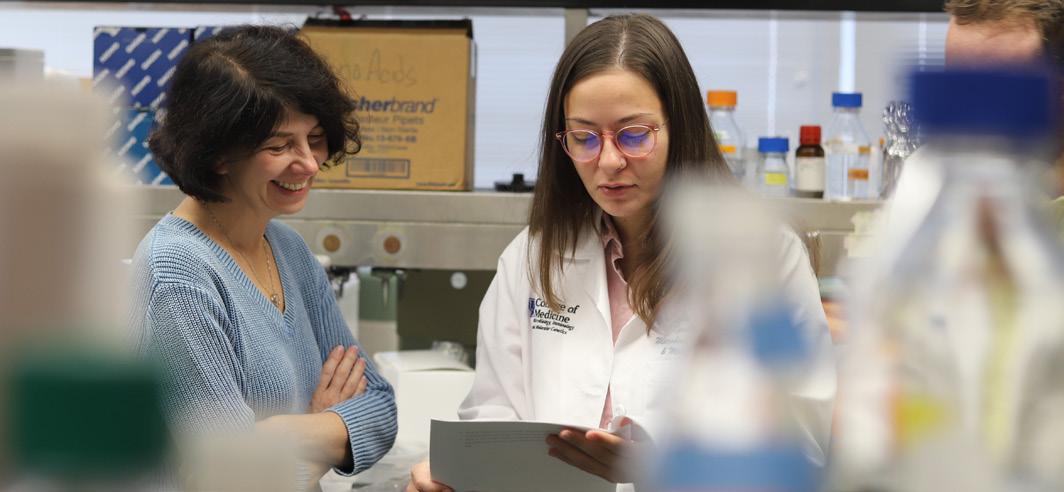
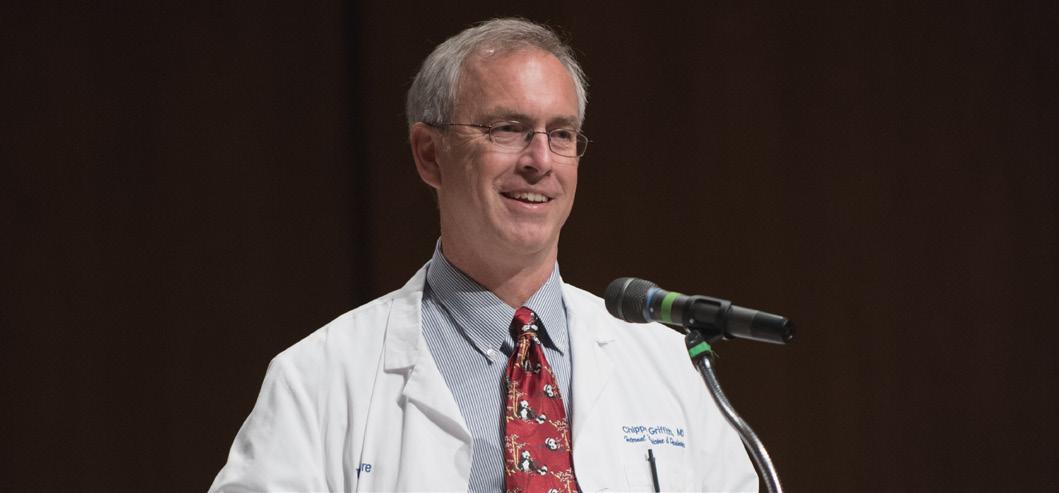

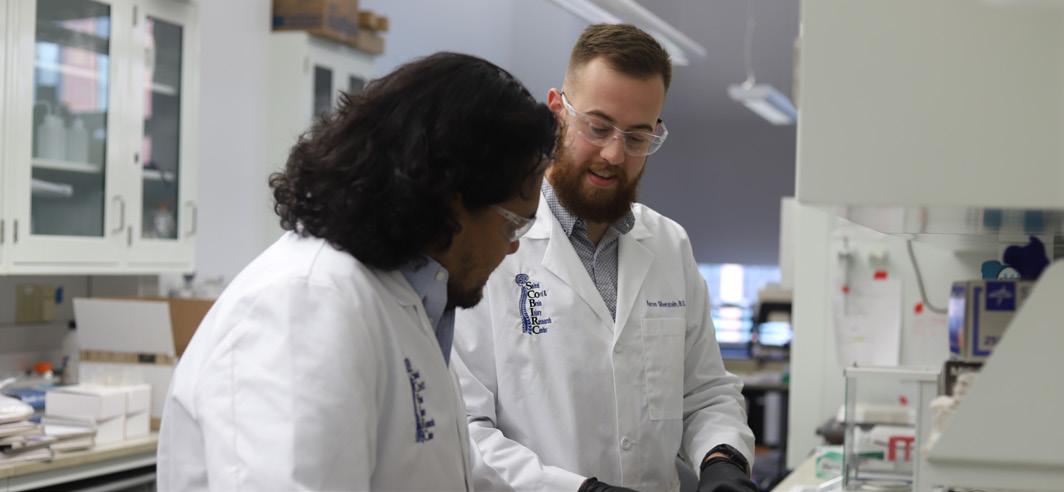
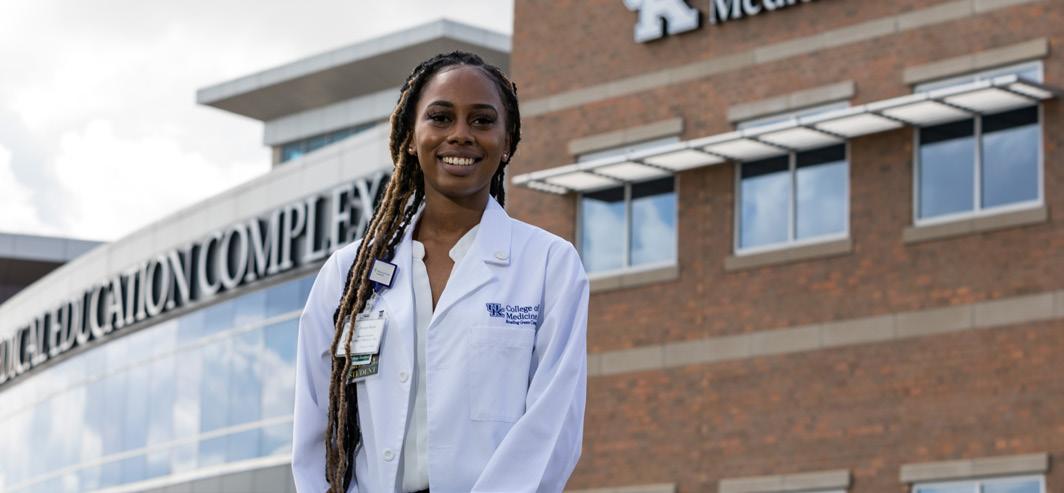
01 Message From Leadership 02 Mentorship in the Lab of Dr. Natalia Korotkova 03 Spotlight on the Department Chair 04 LGBTQ+ Mentorship Program Builds Supportive Community 05 Kristin Miller is Paying it Forward Leading the WIMS Mentoring Program 06 UK’s MD/PhD Program Prepares Trainees for Well-Rounded Careers 12 2022 White Coat Ceremonies 14 Acting Dean Charles Griffith’s Impact Through More than 30 Years of Mentorship at the UK College of Medicine 20 University of Kentucky College of Medicine By the Numbers 22 Early-Career Faculty Excel Under Alliance Research Initiative 24 Trailblazers in Medicine 26 Dr. Mary Sheppard Receives First-Ever Alliance Membership Award 27 From Mentee to Mentor: Dr. Jennifer Murphy 28 UK College of Medicine Alumni Reunion 29 Dr. Elizabeth Rhodus Promotes ‘Healthy Aging across the Bluegrass’ Dr. Crystal Totten Selected for National Diversity, Equity, and Inclusion Program 30 With $1 Million Donation Jackie Cain Supports Students at Northern Kentucky Campus 32 Bill Gatton’s Historic $5 Million Gift Supports Medical Students A Gift to the Dean’s CORE Society is an Investment in Kentucky’s Future 02 12 24 14 06 FEATURES
A Hub for Exceptional MENTORSHIP
A great mentor can pave the way for generations to come. They are vital, and come in many forms. They can be your supervisor, your colleague, your friend.
In my case, one of the most significant mentors of my career is all three.
I would not be where I am today without the mentorship of Charles Griffith, MD, MSPH, acting dean of the UK College of Medicine. The first time our paths crossed, Dr. Griffith was an internal medicine/pediatrics resident.
We began to work closely together as faculty when we were both thirdyear clerkship directors in the late 1990s. At that time, I remember calling Dr. Griffith about how to deal with some challenging situations. He always provided excellent advice.
For two years, Dr. Griffith and I served as the student affairs deans, and I am grateful for the time we spent together supporting students in every aspect of their education and specialty selection. When I returned to Bowling Green, Ky., six years ago to start our regional campus, I reported directly to Dr. Griffith in his role as vice dean.
As you can see, our paths have crossed in many ways for over 30 years now. Throughout that time, Dr. Griffith has continued to be an invaluable mentor to me. He is a good listener who does not jump to conclusions.
I have watched him manage challenging situations where all individuals felt heard and respected regardless of the outcome. He has encouraged me to think creatively about solutions to problems, even when that meant trying something that has never been done before.
The thing I admire most about him is his respect for everyone: patients, students, residents, faculty, and staff. On a more personal level, Dr. Griffith has a great sense of humor which has helped make difficult days a bit easier. I am thankful for his ongoing mentorship.

The UK College of Medicine houses many incredible individuals who are paving the way for the next generation. I feel particularly blessed to have had so many amazing mentors during my in the college. There are far too many to personally thank here, but I would also like to thank Lon Hays, MD, and C. Darrell Jennings, MD, for their mentorship over the years.

In this magazine, you’ll hear from graduate students about how much of a game changer mentorship is within a research lab. You’ll read how exceptional mentors within the MD/PhD program are creating opportunities for physician-scientists, and how current mentees are raising the bar for what can be accomplished with the program. You will learn how experienced faculty in the Alliance Research Initiative are guiding early-career researchers to obtain major grants.
You will also see that I’m far from the only person impacted by Dr. Griffith’s exceptional mentorship in his 30-plus years at the UK College of Medicine. (See page 14.)
Thank you for reading,
| 01
Todd R. Cheever, MD Associate Dean, Bowling Green Campus
MENTORSHIP IN THE OF
DR. NATALIA KOROTKOVA
The work of a research lab in the basic science department of a medical school is to fill gaps in scientific knowledge. But an essential responsibility of a lab leader is to prepare the next generation of researchers.
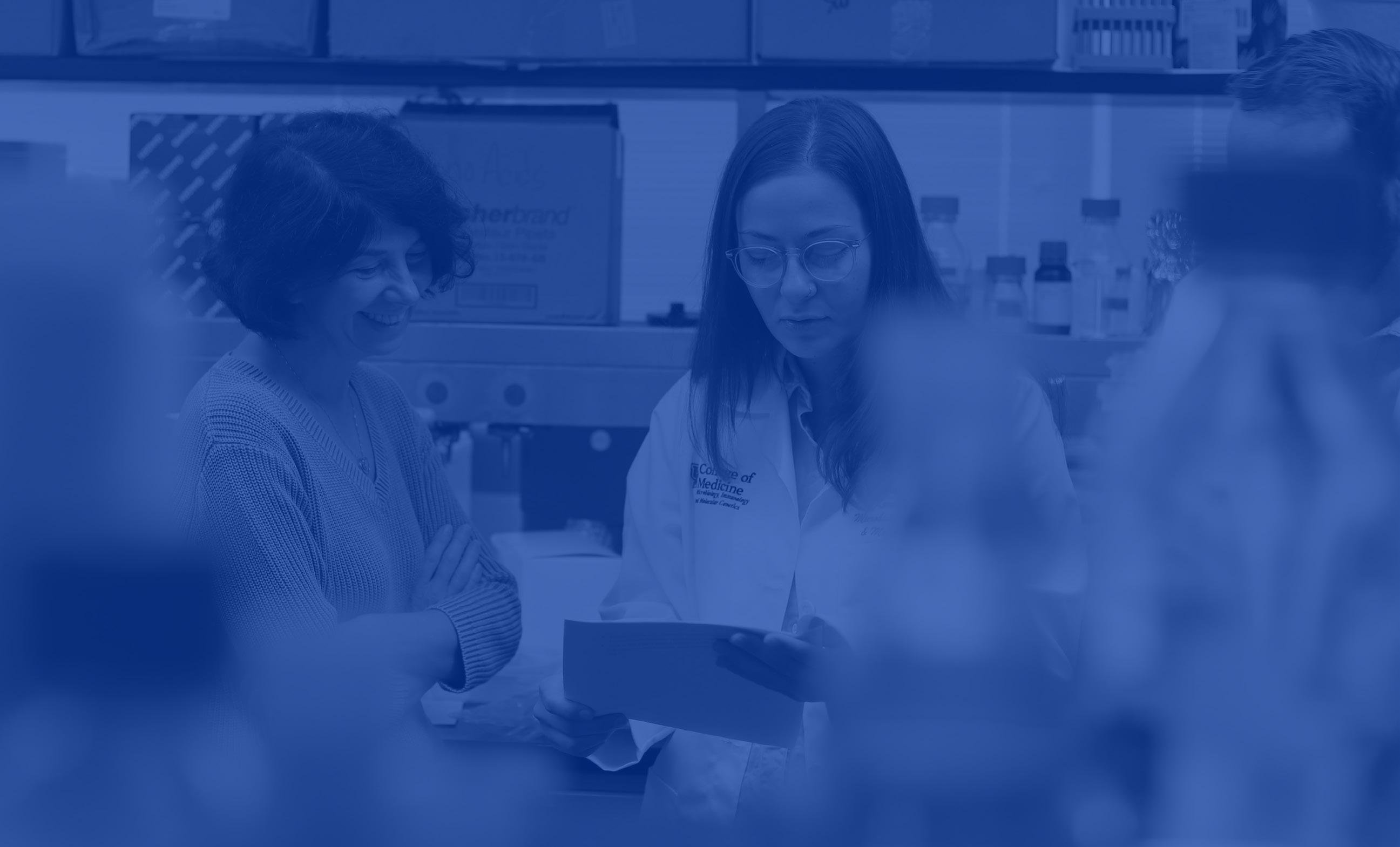
Natalia Korotkova, PhD, of the UK College of Medicine Department of Microbiology, Immunology, and Molecular Genetics leads a lab studying the molecular mechanisms of infection caused by streptococci. At the same time, Dr. Korotkova mentors two graduate students who work as her research assistants, Nicholas Murner and Svetlana Zamakhaeva.

According to Dr. Korotkova, mentoring is a long-term commitment. “It’s a gradual development of skills, knowledge, and confidence, over four or five years,” she said. “That’s how you learn to develop a project, publish your findings, and get funding.”
Murner agreed. “Having a good mentor makes you a scientist,” he said. “You need someone to push you sometimes. And pull you in, sometimes, too, when you need it.”
Zamakhaeva has worked with Dr. Korotkova for over three years and offered an insightful metaphor. “A mentor is like a lighthouse,” a guard as well as a guide.
Mentorship is woven into daily work in Dr. Korotkova’s lab. “It is very rewarding to watch students grow developing their ideas and collaborating with each other,” Dr. Korotkova said. Even—or perhaps especially—when energy is low, mentorship is essential. “Negative results can really do that,” Zamakhaeva said. “But Natalia just says ‘well, we need to think about it. Negative results are valuable. They could lead to big discoveries.’”
02 |
SPOTLIGHT ON THE DEPARTMENT CHAIR
“Natalia’s door is always open,” Murner said. “I’m a secondyear graduate student, so I make mistakes. But I’m never afraid to tell my boss.”
After a long separation during COVID-19 restrictions, the door to her home was open, too. The team celebrated their reunion with pizza and volleyball, happy to be able to gather together again.
A mentor can also make sure you get what you need to grow as a scientist. Zamakhaeva said that Dr. Korotkova allows time for them to seek professional development opportunities, such as conferences. With funding for conferences, graduate students can present their work while networking with scientists who may someday become colleagues.
Asked how faculty can become good mentors, Dr. Korotkova remembers her postdoctoral training in the lab of Dr. Mary Lidstrom, a professor of microbiology at the University of Washington.
“I learned from my own mentor how to be a mentor,” Dr. Korotkova said. “She created a friendly, positive environment where people could be excited about research.

“And students are the heart of it all.”
Ilhem Messaoudi, PhD, came from the University of California-Irvine to chair the UK College of Medicine Department of Microbiology, Immunology, and Molecular Genetics. She is a fellow of the American Academy of Microbiology and a member of the Board of Scientific Counselors to the CDC deputy director of infectious disease. She brought with her a large portfolio of research on immunity.
Dr. Messaoudi’s research explores variations in individual responses to disease. The overall goals of her program are to investigate the effects of alcohol abuse, obesity, microbiome, and age on immunity. Moreover, her laboratory is uncovering how the maternal immune system achieves the delicate balancing act of fetal tolerance while battling microbes that might endanger both mother and child.
Dr. Messaoudi’s research indicates that this immunological “sweet spot” may be compromised by pre-pregnancy obesity and COVID-19. Finally, the Messaoudi lab is also engaged in studying how emerging pathogens (such as SARS-CoV-2 and monkeypox) cause disease and evaluating new vaccines against them.
Recent outbreaks of COVID-19, polio, and monkeypox have reminded the world that infectious diseases don’t respect geographic borders. Dr. Messaoudi believes that public outreach is a key step in combatting infectious diseases and has participated in several interviews on KET’s “Kentucky Tonight”, and other media outlets to discuss how various emerging and re-emerging diseases are spread and how we can protect ourselves.
“I learned from my own mentor how to be a mentor. She created a friendly, positive environment where people could be excited about research.”
- Natalia Korotkova, PhD
| 03
LGBTQ+ Mentorship Program Builds Supportive Community
At times, learners need specific mentoring to face particular challenges—maybe help with a dissertation, a research project, or studying for an exam. But a more general approach to mentoring, one that focuses on the whole person, can also make a crucial difference in student success.
Last year the College of Medicine LGBTQ+ Advisory Committee launched its own mentoring program to support LGBTQ+ students as they make their way as learners in health care. “Navigating the workplace as an LGBTQ+ community member is tough no matter what field you’re in,” says Brian Hamilton, MEd, director of diversity, equity, and inclusion. “But we recognize there are particular challenges for LGBTQ+ physicians and scientists.”
Brittany Bissell, PharmD, PhD, who practices in the pulmonary/medical intensive care unit at UK HealthCare and teaches in the College of Pharmacy, volunteered to be one of the first mentors in the program.

A mentor in health care for six years, Dr. Bissell remembers signing up for the LGBTQ+ Mentorship Program as an easy process. “You just fill out a form on your background and interests, and then answer some simple questions about the role you’re interested in playing, and what your motivation for mentorship is.”
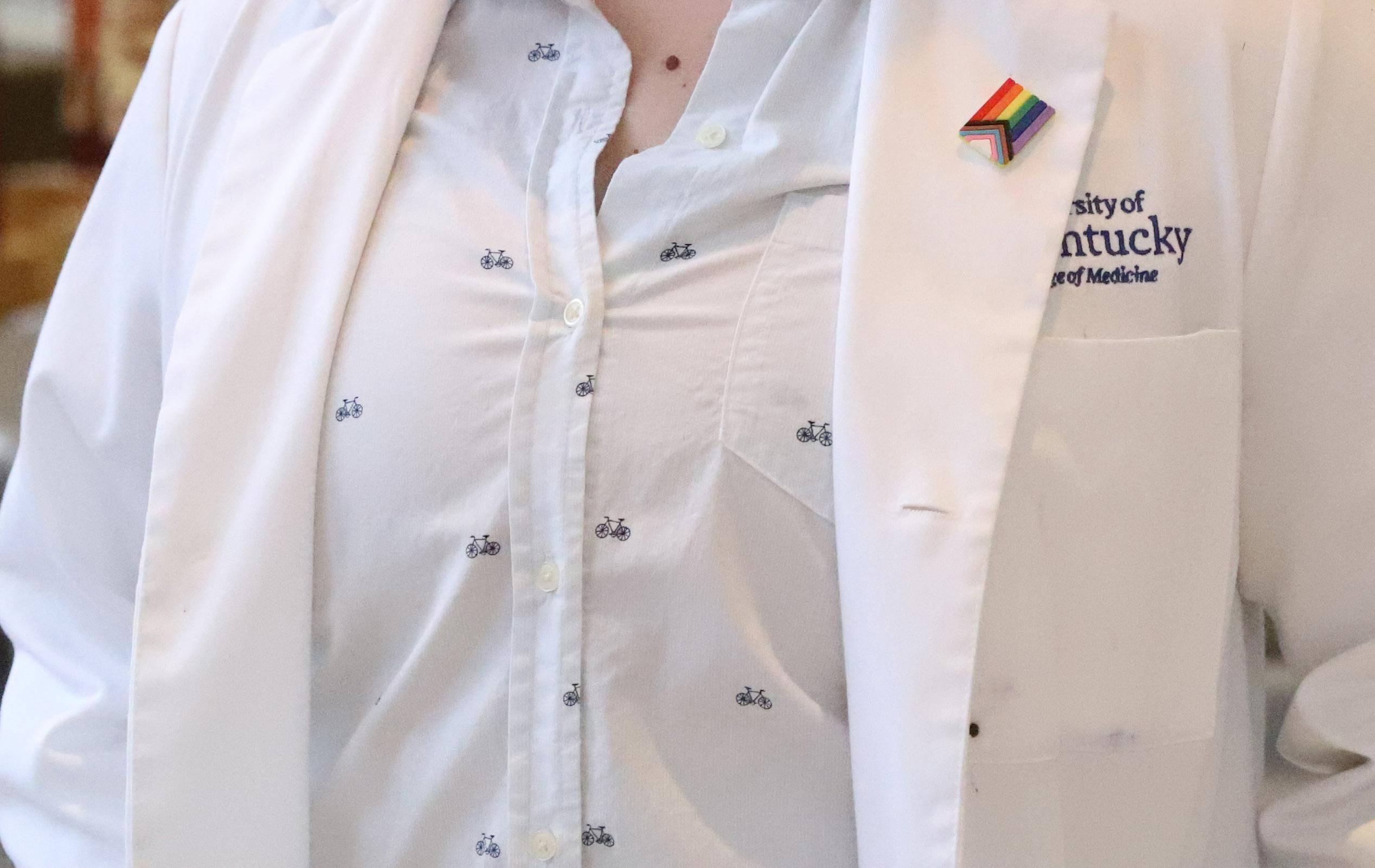
Her mentee, third-year medical student Taylor Bradley, who was herself a mentor to younger students in college, points out that they have much in common. “We both enjoy staying busy,” said Bradley of Dr. Bissell. “We’re peopleoriented.”
Every mentor-mentee bond involves offering advice, some of it personal. But the LGBTQ+ Mentorship Program was designed to address specific needs which DEI director Hamilton characterizes as “not formally tied to academic and professional success.”
Bradley specifies some of the challenges LGBTQ+ mentors and mentees discuss. “You talk about things that are difficult to bring up. How to navigate being out during medical education. How to be comfortable with people you’re working with.”
The results of such mentoring can be lifechanging. “I’ve seen the impact,” Dr. Bissell said. “We as a society do better when we support each other and provide relationships that support, uplift, and provide a pathway.”
This year, Bradley is taking on the important responsibility of the LGBTQ+ mentor-mentee matching process. To potential mentors, she says, “Don’t be afraid to put yourself out there. Remember the more transparent you are about difficulties you’ve faced, the more helpful you can be.” To mentees, Bradley says “Reach out. People are happy to help. Don’t be afraid.”
You talk about things that are difficult to bring up. How to navigate being out during medical education. How to be comfortable with people you’re working with.”
Kristin Miller is Paying it Forward Leading the WIMS Mentoring Program
Kristin Miller, a UK College of Medicine graduate student in toxicology and cancer biology, is leading the effort to expand mentorship opportunities for women through Women in Medicine and Science (WIMS).
Founded in 2019, the WIMS Mentoring Program facilitates opportunities for women’s career advancement in the fields of medicine and science. All College of Medicine female faculty, medical students, PhD students, postdoctoral trainees, residents, and fellows are members of WIMS, and all are encouraged to come to bimonthly meetings and participate on committees. WIMS honors its mentors and mentees each year, and the group also sponsors an event every fall featuring lectures and workshops led by a nationally renowned visiting professor.
Miller has been involved in WIMS for three years, and now she is directing the WIMS Mentoring Program, an essential part of the group’s mission.
“It’s a process,” Miller explained. “At the beginning of the year, we send out a survey where you can note what your research interests are, whether you’re interested in personal or professional mentoring. Both sides—mentors and mentees—fill that out. It takes a few weeks to work out the matches. And that’s the starting point.”
Miller’s own experience has taught her that mentorship can open doors for students. “I’m from Appalachian Kentucky—Metcalfe County. And when I was in high school, I knew I loved science, but I didn’t know that research was a career option.”
When Miller arrived at the University of Kentucky as an undergraduate, she connected with Appalachian Career Training in Oncology (ACTION), a program of the Markey Cancer Center, and was matched with mentor Jessica Blackburn, PhD, in the molecular and cellular biochemistry department.
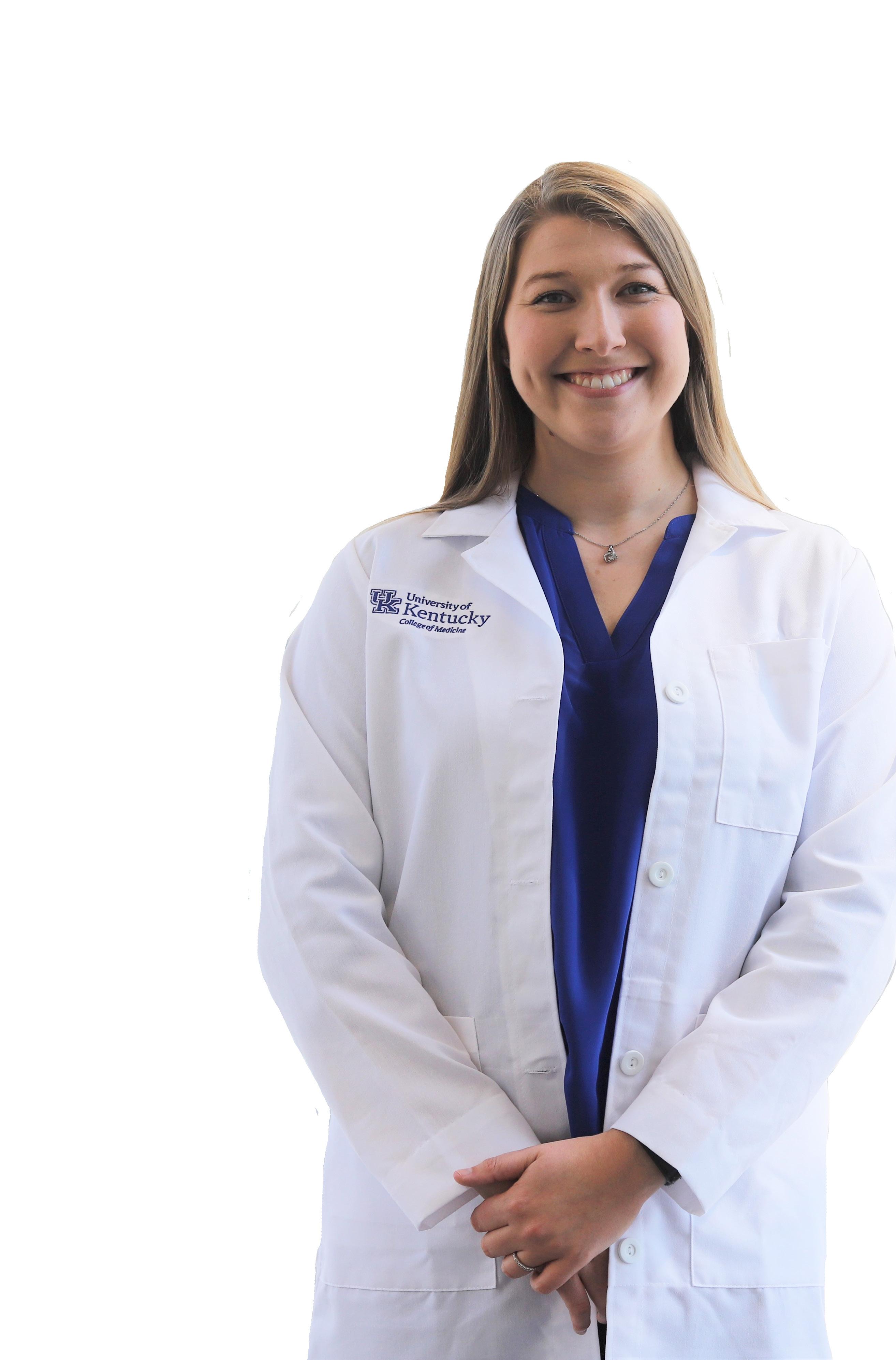
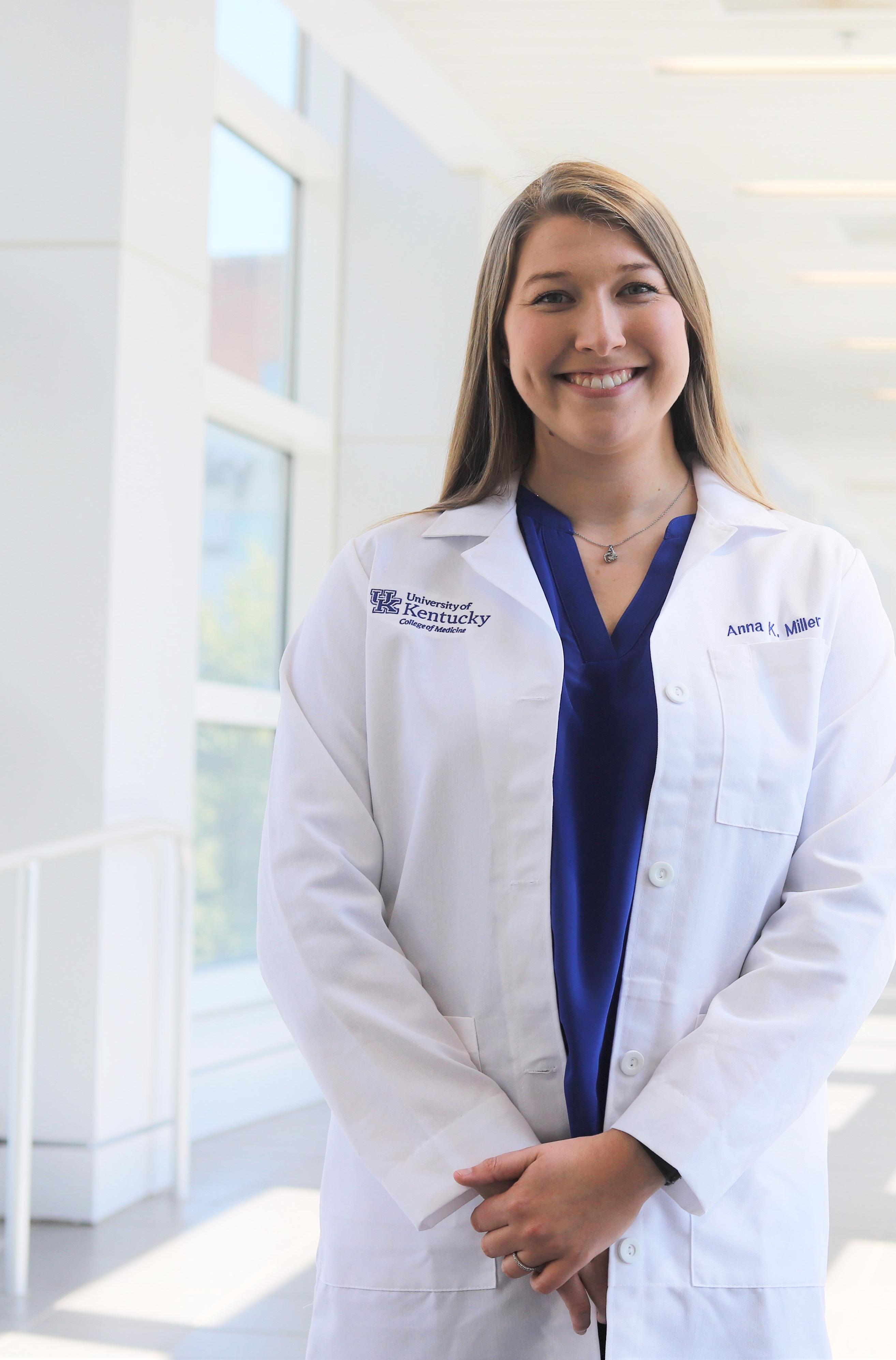
Now Miller is a PhD student looking forward to a future in research.
“I’m an example of why mentorship is important,” she said. “I wouldn’t be where I am now without a mentor, and so I value the importance of helping others to find a mentor to guide them.”
UK’S MD/PhD PROGRAM PREPARES TRAINEES FOR WELL-ROUNDED CAREERS

Laura Krueger and Aaron Silverstein share the same career aspiration. They want to become physician-scientists, which will allow them to fulfill both of their passions – medicine and research. While they are both on the same trajectory, they didn’t quite get to this career path the same way.
After earning her undergraduate degree, Krueger spent two years working on staff at Cincinnati Children’s Hospital. There, she networked with a resident who had an MD and PhD, and being exposed to the daily life of a physicianscientist in the hospital setting inspired her to go back to school.
Meanwhile, Silverstein thought his career path was cemented on the clinical side. The Paducah, Ky., native wanted to become a clinical psychologist, but it was exposure to the research side of training that sold him on the combined degree. His undergraduate mentor Warren Alilain, PhD, associate professor of neuroscience, allowed him to attend a conference to explore recent findings, network with fellow trainees, and meet the scientists who authored papers he read in class. From there, he “fell in love” with both fields of study.
To achieve their shared goal, Krueger and Silverstein are in the University of Kentucky College of Medicine’s MD/PhD
program, a growing combined degree program with the infrastructure to thoroughly prepare students for wellrounded careers in medicine, research, and academia – no matter which dream they have at the beginning of training. As UK’s MD/PhD program continues to grow, more and more trainees are realizing their full potential.
According to the Association of American Medical Colleges (AAMC), the MD/PhD career “is busy, challenging, rewarding, and offers opportunities to do good for many people by advancing knowledge, developing new treatments
06 |
for diseases, and pushing back the for diseases, and pushing back the boundaries of the unknown.”
“These are people who can bridge both worlds,” said program director Sidney Whiteheart, PhD. “They’re basic scientists doing experiments, understanding the disease, and then they know the medical science of using that knowledge to treat patients.”
The MD/PhD program recruits and trains students from the Commonwealth and across the country. With six health care colleges within walking distance on one campus, UK possesses a solid structure and collaborative atmosphere, and because of this, is uniquely poised to host this kind of multidisciplinary program.
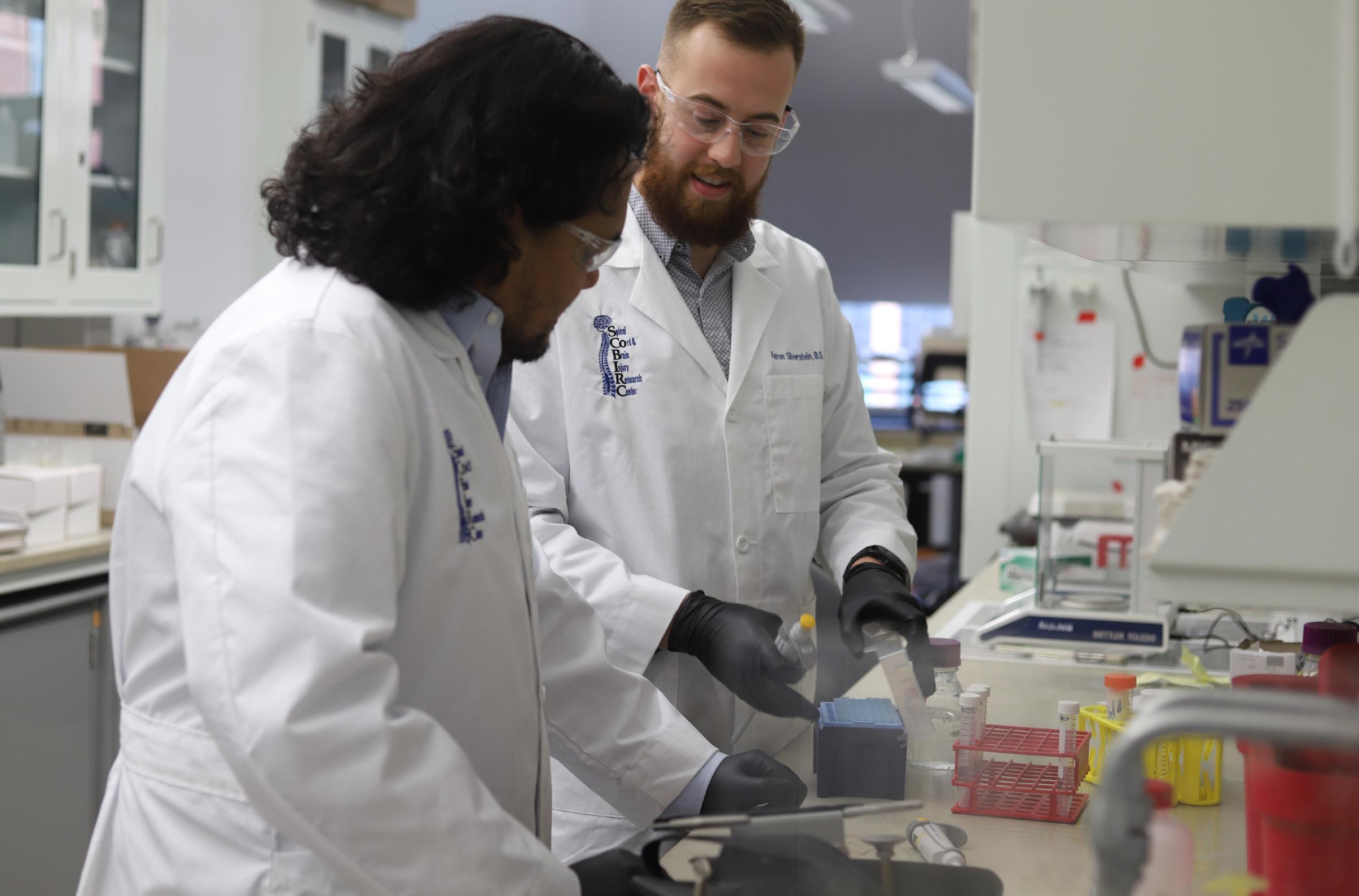
The UK College of Medicine’s holistic training begins with the first two years of medical school and closes with the

final two years of medical school. In between, in years three through six, students complete their PhD.
The College of Medicine collaborates with UK’s colleges of arts and sciences, engineering, pharmacy, and public health to provide multiple disciplines to pursue graduate training. These include traditional biomedical specialties such as anatomy, biochemistry, pharmacology, physiology, and toxicology, but also biomedical engineering, epidemiology, gerontology, and
“There’s a broad approach to our program. We engage more of the University, and that enables students to pursue their interests,” said co-program lead Richard King, MD, PhD. “That means when they finish the program, they’ve had a much more tailored type of experience that they can then use to build up to that next step in their careers.”
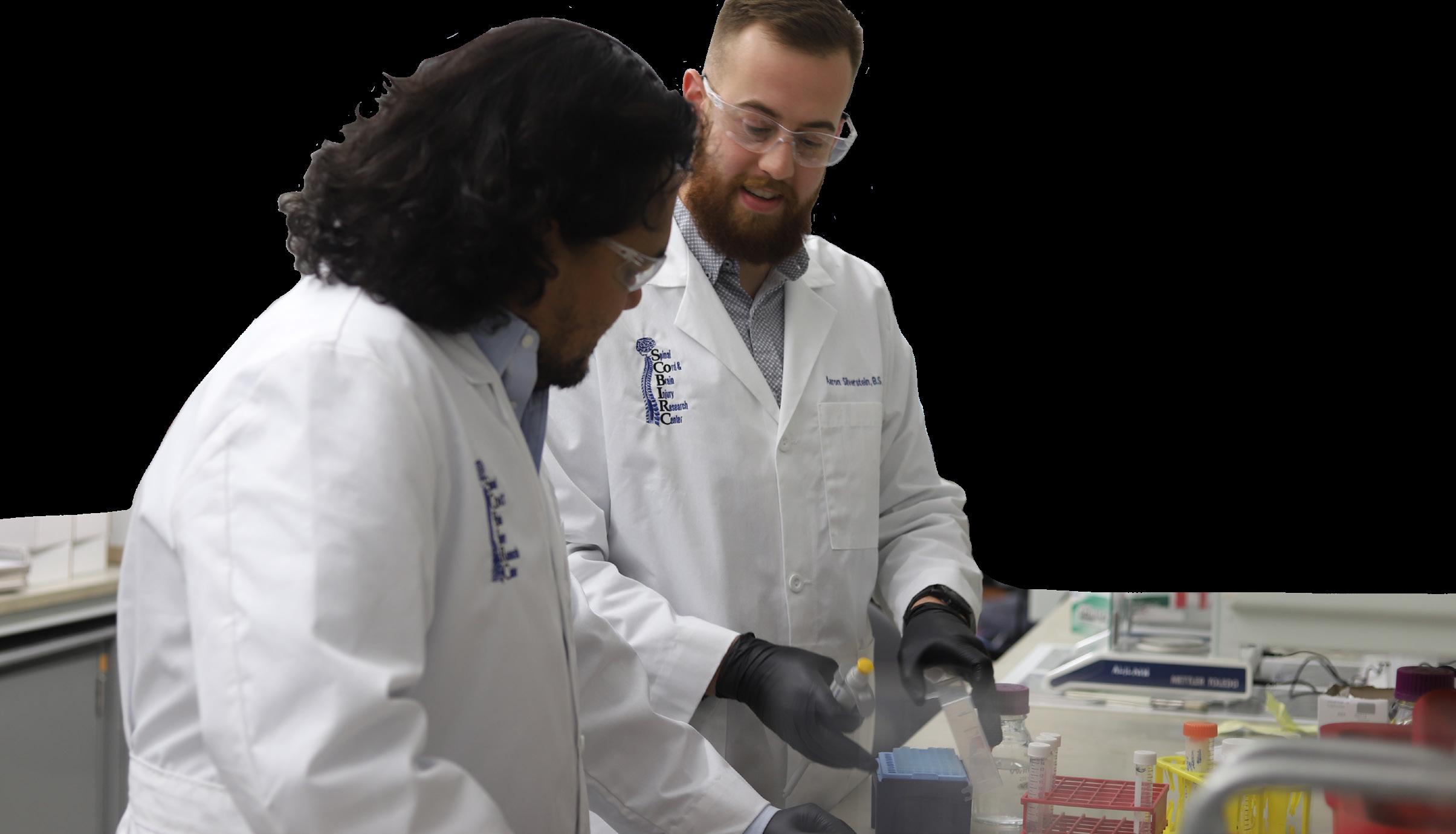 biostatistics.
biostatistics.
| 07
As of fall 2022, in total, there are 32 trainees in the program.
Warren Alilain, PhD, associate professor of neuroscience (left), mentors MD/PhD student Aaron Silverstein in his lab that studies spinal cord injury. MD/PhD students gain experience in research laboratories along with medical training.
Upon completion of the program, most students will then apply for residency and officially enter the medical field with foundational basic science knowledge. More than 80% of UK’s MD/PhD graduates have remained in academic medicine.
To leadership, the MD/PhD program is not just about helping students earn credentials. Dr. King said MD/PhD students gain a “good chance to fail, and to learn from those failures” so that they are not afraid to try new things. The PhD side of training teaches them how to approach new ideas, understand limitations, and test hypotheses. Dr. King said these skills require “time to nurture and to perfect,” which UK’s MD/PhD training program provides.

When co-program lead Christopher Simmons, MD, PhD, mentors trainees, he emphasizes the experiences that the program provides to set realistic expectations for students based on their career interests. He is an alumnus of UK’s program, and he knows how important that was for him.



“A lot of those skills come down to, ‘Can you think critically? Can you appraise the literature? Can you write an outstanding grant? And can you form meaningful relationships with peers who will help you to continue on a track record of success?’” Dr. Simmons said.

Silverstein is now a second-year graduate student who studies spinal cord injury through the UK Spinal Cord and Brain Injury Research Center. Silverstein has trained under Dr. Alilain since undergrad, but he has been able to collaborate with faculty, staff, and students in other labs and departments – and the training has evolved.
In early years, Silverstein read papers, learned techniques, and asked a lot of questions. He then began his first research projects and published his first paper during his first year of medical school. As part of his PhD training, he formed an
Beth Garvy, PhD
Senior Associate Dean for Biomedical Education
Richard King, MD, PhD Associate Professor of Neurology Oversees M3 and M4
Christopher Simmons, MD, PhD Assistant Professor of Pediatrics Oversees M1 and M2
Therese Stearns Program Coordinator
Sidney Whiteheart, PhD MD/PhD Program Director Oversees PhD
MD/P h D PROGRAM LEADERSHIP
In the last year, trainees generated more than 20 publications and presentations.
advisory committee of five to six faculty. He just passed his qualifying exam for his PhD, and a major task in that process was composing a grant proposal.
Through it all, Silverstein has been impressed by how faculty – from both the medical and scientific side – are willing to take time to provide resources and expertise. UK protects the time of its faculty so they are available to students, and so they can continuously develop their mentorship abilities.
“I think the collaborative environment that we’re in at UK is one of the most impactful components of my training,” Silverstein said. “It’s not there at every university that I visited or interviewed when I was looking at MD/PhD programs.”
After earning his PhD, the next step for Silverstein will be his third year of medical school – which is where Krueger is currently. She agrees that the collaborative atmosphere has been crucial to her success on both the clinical and basic science sides of training. The MD/PhD program, she said, is positioned at a campus that includes all the resources and support that students need to succeed, but it is also tight-knit so students can lean on each other.
“We’re a very collegial group that recognizes that we are all going to be colleagues, that we all need each other’s help in certain things,” she said.
Krueger completed her doctorate in the lab of Ann Morris, PhD, in the UK College of Arts and Sciences, where she studied the genetics of eye and retinal cell development. This fall, she began her clinical clerkships and looks forward to her fourth year when she will prepare for the residency match.
After completing the PhD portion of her training, Laura Krueger is now in the midst of her thirdyear clinical clerkships. She says the “collegial group” of MD/PhD program faculty, staff, and trainees has helped her advance into the physician-scientist she wants to be.
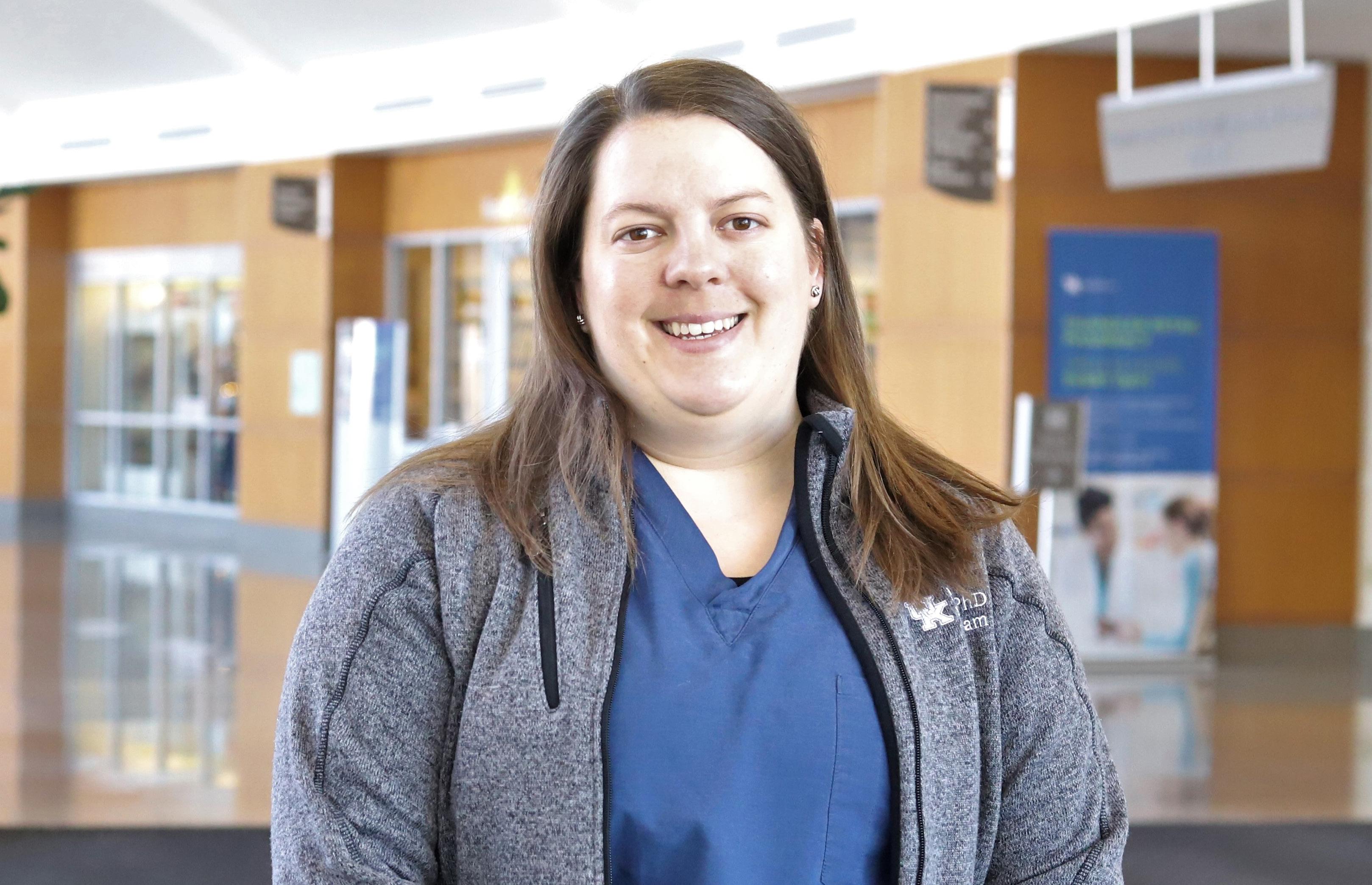
There’s a broad approach to our program. We engage more of the University, and that enables students to pursue their interests. That means when they finish the program, they’ve had a much more tailored type of experience that they can then use to build up to that next step in their careers.“
Dr. Richard King
| 09
Her training at UK will help her achieve her dream of becoming a pediatric geneticist. Meanwhile, Silverstein wants to pursue neurosurgery, with dreams of holding a faculty appointment and running his own lab.
The future looks bright for the UK College of Medicine’s MD/PhD trainees like Silverstein and Krueger – and for the program itself.
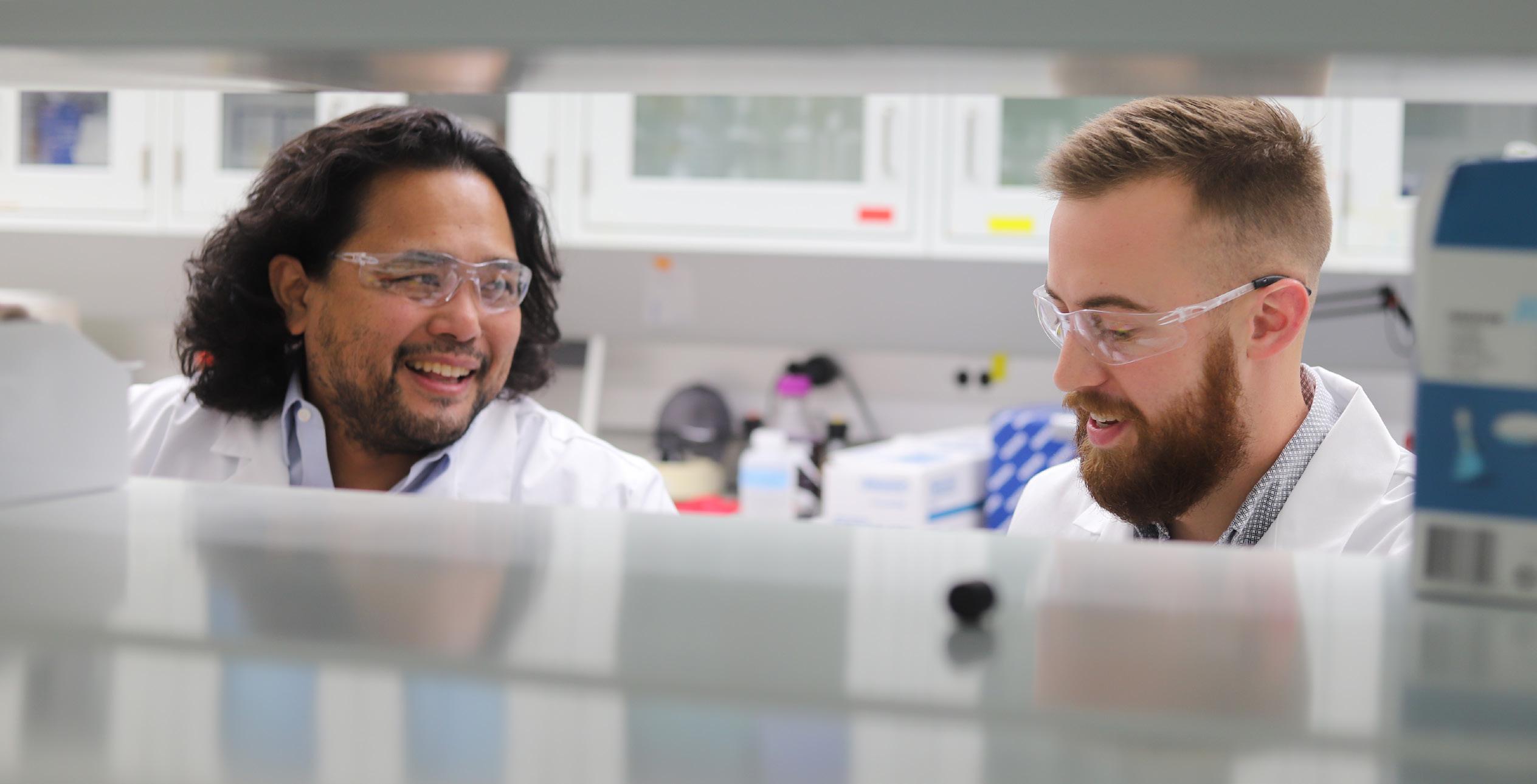
Leadership has worked toward key goals including the expansion of learning opportunities, enhancement of diversity within the program, and the increase in number of students to prepare more physician-scientists.
They have continued to meet these goals as the number of total trainees has grown to 32, with six students in the current M1 class – the program’s largest and most diverse class ever.
As the program develops, leadership continues to implement new career-building opportunities. Recently, they added a monthly clinical case study and program meetings focusing on career skills.
Beth Garvy, PhD, senior associate dean for biomedical education, said UK’s program began in 1988, yet it competes with programs that are much more established – some up to 50 years old. She said the big goal for the program is to get National Institutes of Health funding, which would help validate the program’s strengths and help advance education, research, and clinical care in the Commonwealth.
“Our success really relies on success in recruiting, success of the students, success of our mentors,” Dr. Garvy said, “and I think we’re really moving in a positive direction.”
You can support our MD/PhD students by visiting uky.networkforgood.com In the top right search bar, enter “MD and PhD Scholarship Program” or the fund number, “1215380680 420100.” Then click the gray “donate” button and fill out your payment information.
There are 11 women and 4 minority trainees currently in the program.
MD/PhD student Aaron Silverstein (right) credits the collaborative environment at UK for helping him thrive in the combined degree program. “It’s not there at every university that I visited or interviewed when I was looking at MD/PhD programs,” he said.
10 |
ALUMNI HEAR from MD/P h D PROGRAM
JEFF CHEN, MD, PHD

Internal Medicine Resident, UT Southwestern
Q: How did UK’s MD/PhD training prepare you for your current role?
A: The most important thing research training – and research training at Kentucky – taught me was to not be afraid of being wrong, and to be persistent. That attitude has helped me be more efficient in learning and unafraid to try new things.
BENJAMIN FOWLER, MD, PHD
Vitreoretinal Surgery Fellow, University of Wisconsin

Q: What did you enjoy about your MD/PhD training at UK?
A: The MD/PhD program created an environment that allowed me to develop the foundational skills and mindset of a clinician-scientist. Regular meetings and program retreats were key in honing my focus and maintaining a goal to have a career in medicine and research. Also, the quality of life in Lexington is superb!
MEGHAN HANEY MD, PHD
Pediatric Resident, Cincinnati Children’s Hospital

Q: Would you recommend this program to others, and if so, why?
A: I would highly recommend the UK MD/PhD program to others. I feel like the program really invested in me as an individual and allowed me to customize my training path to set me up for success. The faculty and staff involved with the program are outstanding, and the medical school and graduate school training are both incredible. I made lifelong friends and mentors at UK, and choosing to go to UK was one of the best decisions I have ever made.
ESE IGHODARO, MD, PHD

Neurology Resident, Mayo Clinic
(Matriculating into Stroke Fellowship Program, Emory University)
Q: How did UK’s MD/PhD training prepare you for your current role?
A: My career goal is to understand the racial etiologies of health disparities within neurology. The combined MD/PhD training laid the groundwork for my career as a health disparities researcher and neurology clinician. I’m thankful for the supportive network led by Dr. Susan Smyth and Therese Stearns, my PhD mentor Dr. Peter Nelson, and lab colleagues within the Sanders-Brown Center on Aging.

| 11
WHITE COAT 2022 CEREMONIES




The event this year was even more significant as the UK College of MedicineNorthern Kentucky Campus, which opened in 2019, held its fourth white coat ceremony.

significant as the UK College of Medicine-Northern Kentucky Campus, which opened in 2019, held its fourth white coat ceremony and welcomed its fourth class.


The UK College of Medicine welcomed more than 200 new medical students during white coat ceremonies across campuses.


The event this year was even more significant as the UK College of Medicine-Northern Kentucky Campus, which opened in 2019, held its fourth white coat ceremony. This marked the moment when the college had a full complement of medical students –four classes in Lexington, Bowling Green, and Northern Kentucky.
By training more physicians in Kentucky, for Kentucky with exceptional education, the UK College of Medicine is well prepared to address the physician shortage in the Commonwealth so that Kentuckians are provided the compassionate, equitable health care they need.
‘He through his and
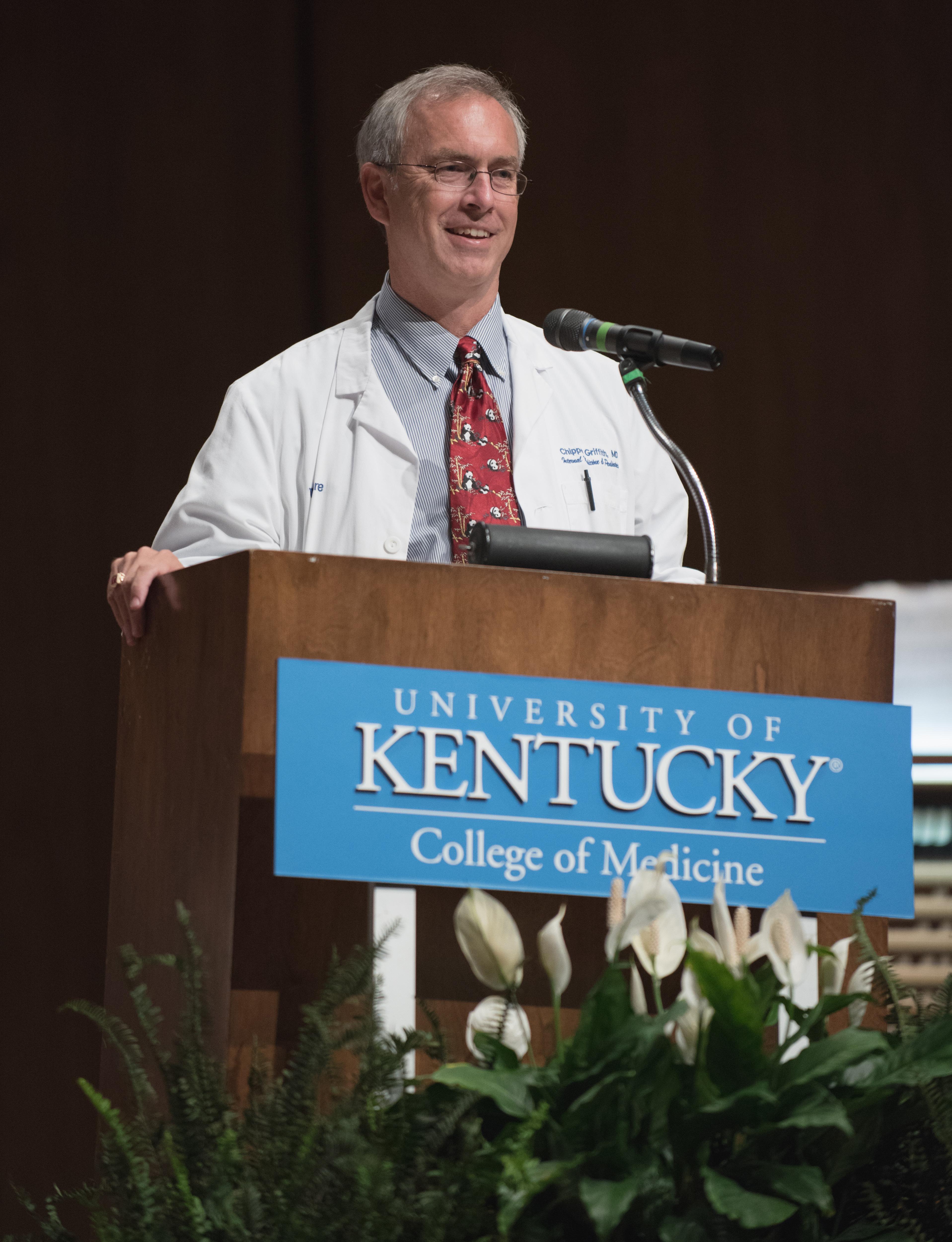
INSPIRES ACTIONS CHARACTER’
Acting Dean Charles Griffith’s Impact Through More than 30 Years of Mentorship at the UK College of Medicine
Since joining the UK College of Medicine more than 30 years ago, Charles “Chipper” Griffith III, MD, MSPH, has been a pillar of the college’s mission and an instrumental leader in its continued expansion of education, clinical care, and research. He started at UK as a resident and went on to hold several leadership positions within the college. Currently, he is a professor and acting dean.
When Dr. Griffith completed UK’s internal medicine-pediatrics (med-peds) residency program in 1992, the college employed just over 400 faculty and was training about 370 medical students at once, along with just under 200 graduate students and 430 house staff. At the time, the College of Medicine was developing into the technologically advanced institution and research powerhouse it is today. UK was one of the first medical colleges across the country to introduce computerbased learning, with much of this transformation happening in the ‘90s. Meanwhile, in the same decade, through more focus on basic science funding, the College of Medicine established additional opportunities for collaborative, transdisciplinary research.
Three decades later in 2022, the College of Medicine has a faculty of more than 1,300 and there are 2,000 medical, graduate medical, and biomedical trainees. The increase in medical students is in part through the recent addition of regional campuses in Bowling Green, Ky., and Highland Heights, Ky., while Dr. Griffith served as vice dean for education. During that same time, research funding grew from about $12 million to
$200 million, research space nearly tripled by square feet, and there are 19 interdisciplinary centers bringing vital solutions from the bench to the bedside for the improved health of Kentuckians and beyond.
Through Dr. Griffith’s continued leadership and a strong team of faculty, staff, and trainees, the College of Medicine will continue to grow, especially through the development of UK’s new, state-of-the-art Health Education Building.
But Dr. Griffith’s tremendous impact at the UK College of Medicine is best showcased through the many faculty, staff, and trainees he has mentored over those 30 years who have gone on to follow successful careers in medical education, health care, and academic leadership. One of Dr. Griffith’s key mentors, Emery Wilson, MD, former dean of the UK College

| 15
of Medicine, said Dr. Griffith made a significant impact through his excellent teaching, compassionate care, and “ability to relate to students through his emotional connection to his profession.”
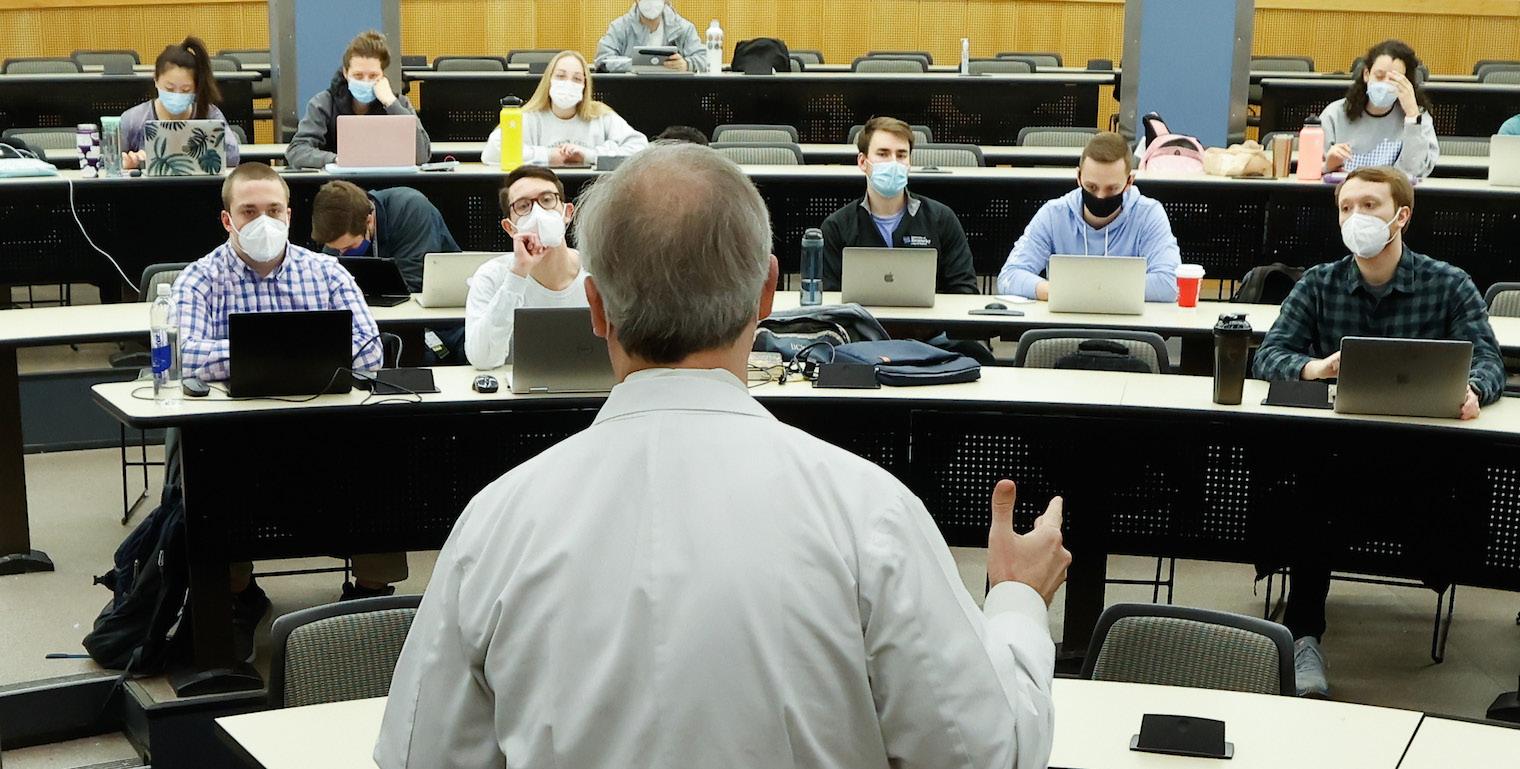

The UK College of Medicine collected stories from several of Dr. Griffith’s mentees – many of whom have stayed at UK to follow his lead.
An ‘Outstanding Medical Educator’
Steven Haist, MD ‘81, MS, associate dean for the Northern Kentucky Campus and associate dean for curriculum and assessment, worked with Dr. Griffith on numerous educational projects and grants from the early 1990s to mid-2000s. Both spent time in the division of general internal medicine and geriatrics before Dr. Haist left in 2008 for the National Board of Medical Examiners. Dr. Haist said that first and foremost, he saw Dr. Griffith as “an outstanding medical educator. He is always thinking about how to make the process better for our medical students and residents.”
On a personal level, Dr. Haist is grateful for Dr. Griffith’s encouragement to apply for the associate dean position at the Northern Kentucky Campus, which brought him back to the Commonwealth in 2018 to be a leader in the college’s initiative for improved health in the state.
“The chance to come back to Kentucky and be involved in recruiting and educating medical students who one day will be caring for Kentuckians, as well as citizens of other states, was a great opportunity,” Dr. Haist said. “I will forever be indebted to Dr. Griffith.”
A Leader by Example
Brian Higgins, PhD, said he instantly connected with Dr. Griffith when was interviewing for his role as assistant professor of microbiology, immunology, and molecular genetics in 2014. Ever since taking the position, Dr. Higgins has worked closely with Dr. Griffith through the Office of Medical Education. Dr. Higgins currently serves as course
“I stayed here for residency because of people like him.”
16 |
- Kristy Deep, MD
director for MD 818: Musculoskeletal and Integumentary Systems and assistant director for MD 810: Foundations of Infection, Disease, and Treatment and MD 829: Multisystem and Integrative Concepts – which Dr. Griffith leads. Through these roles, he has been inspired by Dr. Griffith’s attentiveness to students, his passion for education, and his humility that allows him to serve as a silent leader.
“Dr. Griffith is a leader by example,” Dr. Higgins said. “He gets what needs to get done, and he inspires through his actions and character.”
Dr. Higgins said Dr. Griffith proved this when clinical presenters dropped out one week before MD 818. “With no hesitation at all,” and even while acting dean, Dr. Griffith stepped in and took on two more hours of teaching in the course – because “our students come first.”

Dr. Higgins strives to follow Dr. Griffith’s lead and continues to seek his wisdom in professional development. He applied for the prestigious Harvard Macy Institute Program for Educators in Health Professions and credits Dr. Griffith’s guidance and support for helping him become one of the few educators nationally to be selected for the program in 2021.
‘The Reason I Became an OB/GYN’
Rachel Saunders, MD ‘12, said she was fortunate enough to work in the clinic with Dr. Griffith when she was a third-year medical student at the UK College of Medicine. She remembers being very nervous, but Dr. Griffith was very kind and supportive.
“As I got to know Dr. Griffith better, he became a mentor to me. Over the years, I have looked to him for advice,” she said. “In fact, I credit him for the reason I became an OB/GYN!”
Dr. Saunders said when she joined her college’s faculty, Dr. Griffith asked about her career goals and has supported her dream of wanting to become a medical school administrator. He has done so by pointing her to opportunities to help her achieve her goals. She is now following her dream as a physician and assistant professor in the UK College of Medicine Department of Obstetrics and Gynecology, clerkship director of MD 838, and chair of the college’s admissions committee.
“I am so grateful that I got to meet Dr. Griffith, and I cannot thank him enough for all that he has done for me,” Dr. Saunders said.
| 17
He ‘Believed in my Potential’
Dr. Griffith has been a supportive mentor for Rebecca Todd, MD, since she joined the UK College of Medicine, but especially in 2018 when she took over leadership of the college’s Rural Physician Leadership Program (RPLP) and became associate dean of the regional site in Morehead, Ky. To help Dr. Todd get adjusted to the new role, Dr. Griffith was available for phone calls so they could work through tough decisions together.
“Dr. Griffith believed in my potential even when I was afraid to take on a challenging role,” Dr. Todd said. “He’s a thoughtful listener who values my opinion, and he cares deeply about my personal well-being and professional success.”
Dr. Todd is thankful for Dr. Griffith’s encouragement. Since taking over RPLP, she has helped it grow and flourish. The program now has over 100 alumni, and each spring, it graduates 12-14 medical students with specialized training who are helping address the major need for more physicians and improved health care access in rural areas.
A Valuable Mentor and Coach
Hubie Ballard, MD ‘96, met Dr. Griffith in 1992 as a first-year medical student. Dr. Griffith was teaching a small group about clinical decision-making, and he made an immediate impact on Dr. Ballard’s ability to develop and prioritize a differential diagnosis.

“Dr. Griffith’s self-effacing personality paired with his unmatched aptitude were critical in my development as a medical student,” Dr. Ballard said.
Since those initial classes on clinical decision-making, Dr. Griffith has continued to be a valuable mentor and coach as Dr. Ballard’s career has progressed within the UK College of Medicine. Now, Dr. Ballard is an associate professor of pediatrics at his alma mater and shares Dr. Griffith’s passion for teaching students, interns, residents, and fellows. He remains heavily involved in medical education as a mentor
and faculty advisor for learning communities and several student interest groups.
‘The Heart of a True Physician’
Christopher Simmons, MD ‘13, PhD ‘11, remembers being a UK College of Medicine student who was very nervous about residency. Dr. Griffith was a mentor who helped him feel more comfortable through his unparalleled kindness, ability to listen, and genuine interest in his patients and his students.
Perhaps the most memorable words of wisdom came during residency, “to go out for dinner and dancing with my wife even if I’m post-call,” Dr. Simmons said. “He not-so-subtlety reminded me there is more to life than a job, even when that job is rooted in the practice of medicine.” Dr. Simmons took his advice seriously. Now, he and his wife, Katie Twist, MD ‘10, are happily married clinicians and faculty members in the college who are heavily involved in advancing medical and biomedical education. They both look up to Dr. Griffith and try to embody the example he sets.
“No matter what position he finds himself in, Dr. Griffith always models the heart of a true physician and doesn’t appear to be tempted by ego or the other vices of practicing modern medicine,” Dr. Simmons said.
He Makes Trainees Want to Become ‘Lifers’
Kristy Deep, MD ’03, completed all of her medical training at the UK College of Medicine and has been on the faculty since 2005. She considers herself a Kentucky “lifer,” and much of that is thanks to mentors like Dr. Griffith.
Dr. Deep met Dr. Griffith during her third year of medical school while he was the internal medicine third-year clerkship director. “I stayed here for residency because of people like him,” she said, adding that Dr. Griffith and his fellow faculty “were the kind of doctors that I wanted to be and the kind of educators that I wanted to learn from.” Dr. Griffith was also director of the UK General Internal Medicine Academic Fellowship program, created for trainees who wanted to become lifelong educators. For the two years after residency
18 |
Dr. Griffith shakes hands with first-year medical student Makeba Phillip at the UK College of Medicine-Bowling Green Campus’s 2022 white coat ceremony.
that Dr. Deep was in the program, Dr. Griffith was her primary mentor.
Beyond clinical and teaching skills, Dr. Griffith taught Dr. Deep to prioritize family. “I’ll never forget, even when he was the program director of our residency, he would unashamedly say, ‘I can’t come to that meeting, because it’s my daughter’s dance recital,’ or ‘Nope, I can’t attend that event because I’m coaching my son’s baseball team,’” Dr. Deep said. “And through normalizing that, it made it OK for junior faculty like myself to establish those same priorities. That promoted a positive culture of staying connected to your family while in a rigorous medical career.”
An Exceptional Teacher
Lindsay Ragsdale, MD ‘08, met Dr. Griffith when she was a medical student going through clerkships in internal medicine. “I was so nervous. I just didn’t want to embarrass myself mostly,” Dr. Ragsdale said. “And Dr. Griffith was really so calm.”
One of the main ways Dr. Griffith made Dr. Ragsdale less nervous was by helping simplify complicated medical information. “We had a lot of complex patients, and he was able to really break down the complex problems that patients had and really helped me and our team understand what comes next,” she said. “I think that we really looked up to him as clerkship students.”
Dr. Ragsdale was perhaps most impressed by Dr. Griffith’s commitment to Kentuckians. He put down roots in the Commonwealth and has remained dedicated to the mission of the college to improve health care for the state’s patients. Today, Dr. Ragsdale and her husband, John Ragsdale, MD, MS, are both faculty at the UK College of Medicine, Lindsay the chief medical officer at Kentucky Children’s Hospital and John the assistant dean for clinical education. Like Dr. Griffith, they have put down their roots in Lexington, Ky., and follow his passion for education and compassionate care.
Committed to the Students
Brandy Lawson, senior accreditation manager, works alongside Dr. Griffith through her role in the Office of Medical Education helping the college monitor and maintain its compliance with Liaison Committee on Medical Education (LCME) accreditation standards. Lawson said she is “honored” to work for Dr. Griffith because of his strong values, supportiveness, and kind heart which allows him to make tough decisions for the benefit of the students and the college’s educational mission. However, Lawson is most impressed by Dr. Griffith’s commitment to the students and their educational experience.
“This passion extends to the quality and support of the educational leadership and staff as well the faculty who teach and interact with the students,” she said, adding that Dr. Griffith’s passion for education inspires her own work to advance medical education at the college.
Lawson also said that while he is extremely accomplished in his career, Dr. Griffith is most proud of his family – and that translates in his support of his team’s work-life balance.
Embodies ‘The Highest Level of Compassion Possible’
As a former UK College of Medicine student, general surgery resident, and now surgery faculty at UK HealthCare and the UK College of Medicine, Zachary Warriner, MD ‘12, has known Dr. Griffith through many phases of his training and career. “He has treated me like a colleague and partner at every level - remaining an unending source of knowledge, a constant and reliable source of encouragement, and exemplifying the highest level of compassion possible,” Dr. Warriner said.
Dr. Warriner said Dr. Griffith never forgets the efforts and achievements of those around him, despite his high leadership position. He always highlights others’ successes, “providing the standard for which I have modeled my own career,” Dr. Warriner said. “His selflessness and dedication to the mission of the college in training future generations of physicians for the Commonwealth will positively affect our state for generations to come.”
“Dr. Griffith’s self-effacing personality paired with his unmatched aptitude were critical in my development as a medical student”
| 19
- Hubie Ballard, MD
the
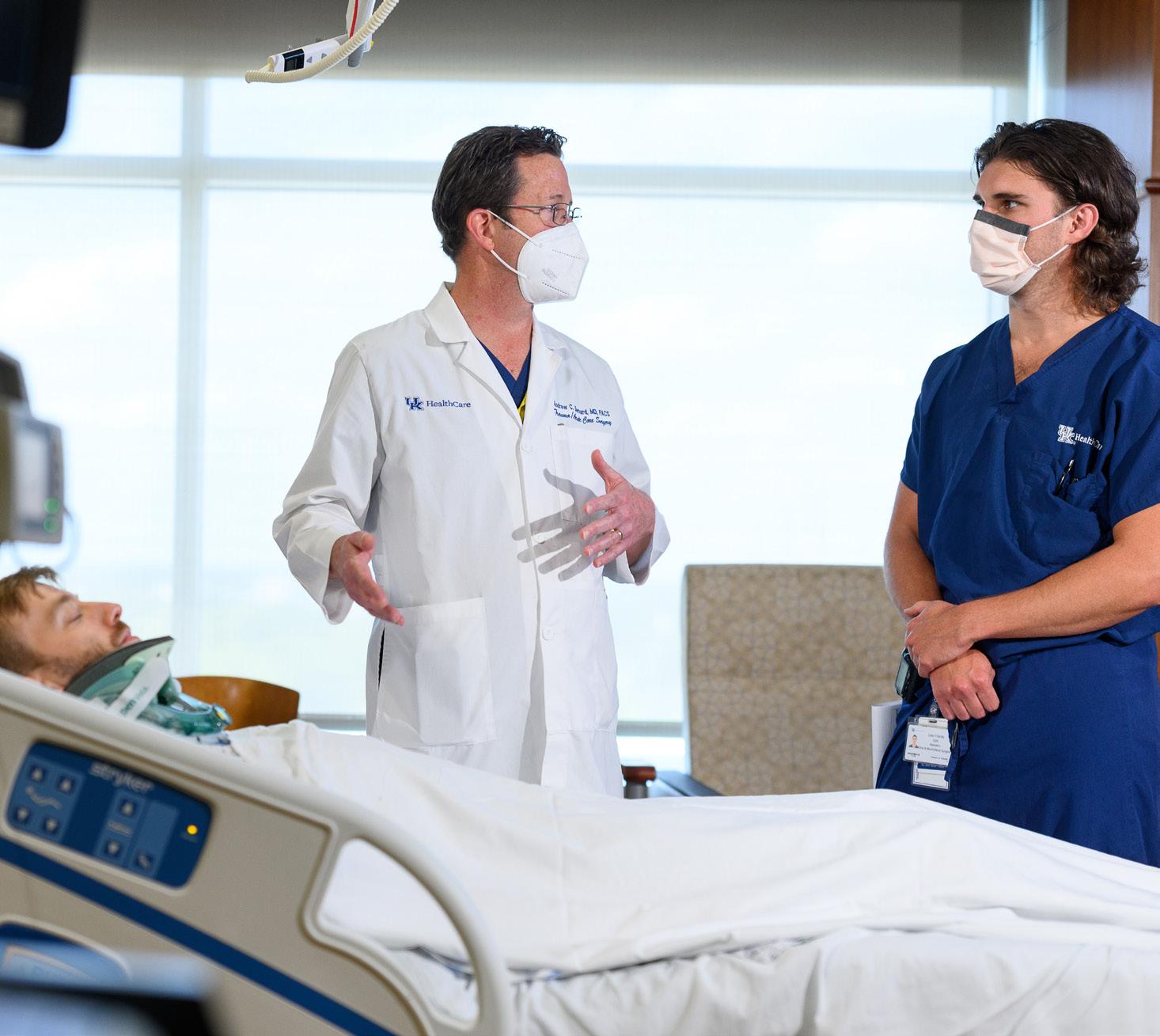
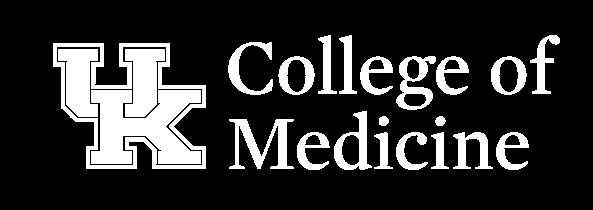
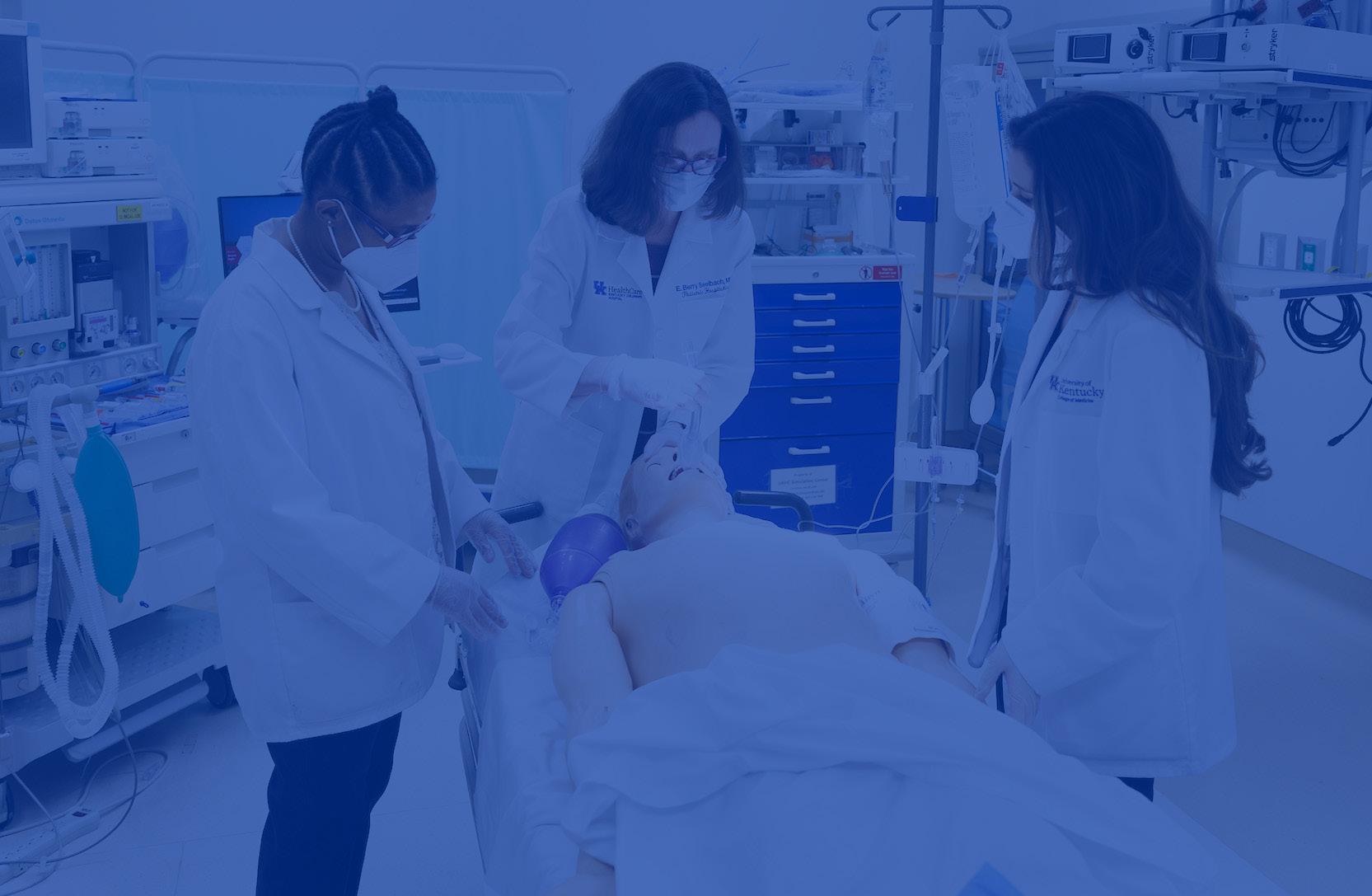
OF KENTUCKY
OF MEDICINE
BOWLING GREEN LEXINGTON MOREHEAD NORTHERN KENTUCKY full-time and part-time faculty members providing excellent medical and biomedical education
817 20 |
UNIVERSITY
COLLEGE
By the Numbers By
Numbers medical students across all four UK College of Medicine campuses at the start of the 2022-23 school year.
1,104 Clinical Faculty 215 Basic Science Faculty
1,236
total staff members supporting the mission of the college across all campuses.
358
MS and PhD students, as well as postdoctoral fellows, advancing their biomedical training.

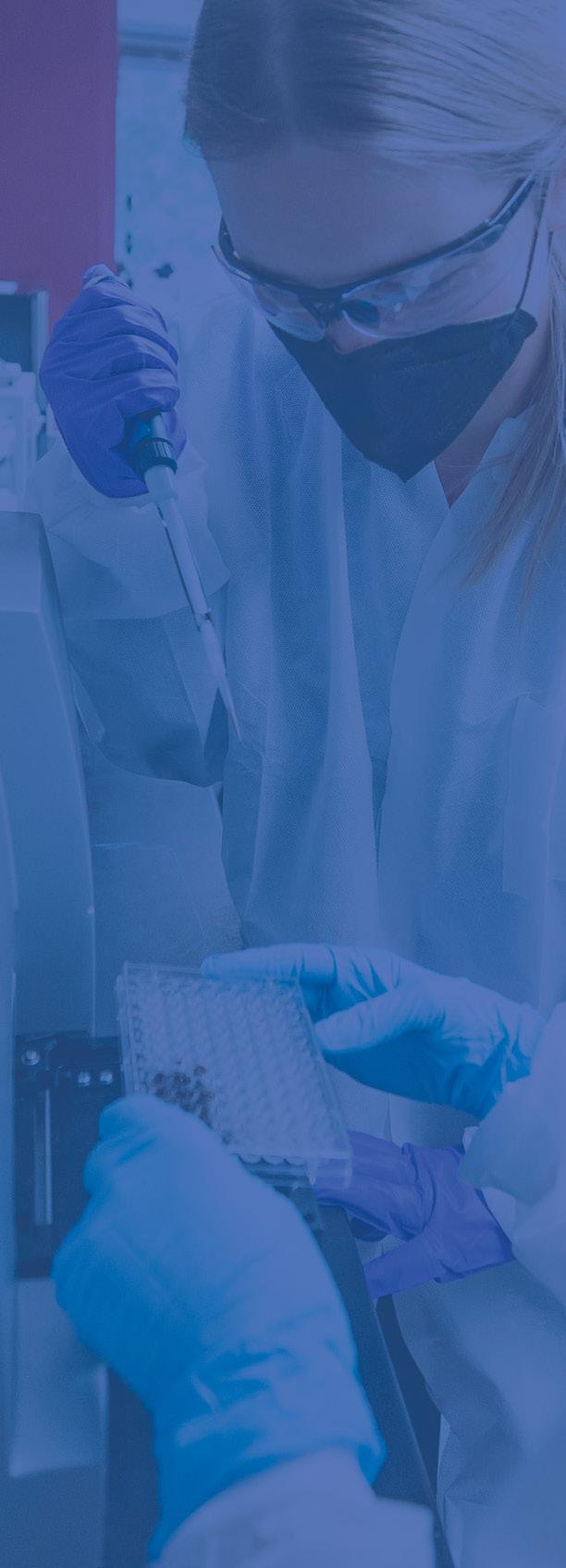
815
residents and fellows advancing their medical education through ACGME programs as of Aug. 16, 2022.
888
new awards bringing in key funding to support the college’s research efforts.
321
principal investigators leading new investigations to find solutions for Kentucky’s most urgent health needs.
IN TOTAL NEW RESEARCH FUNDING
*All statistics are as of June 30, 2022, unless otherwise noted.
ALLIANCE RESEARCH INITIATIVE
The College of Medicine’s Alliance Research Initiative was designed to provide seed funding and support for multidisciplinary teams of scientists, from colleges and centers across the University’s campus, to find answers to the health challenges that disproportionately affect Kentuckians.
Meet some of the early-career faculty who have made a significant impact through the initiative.
When he was a cardiology fellow, Gaurang Vaidya, MD, faced a persistent question while providing care for heart failure patients – how much extra water is in the patient’s body? The answer to that question is important in determining treatment at bedside, but the standard procedure for measuring the extra water volume is either invasive or requires dedicated training in using imaging tools.
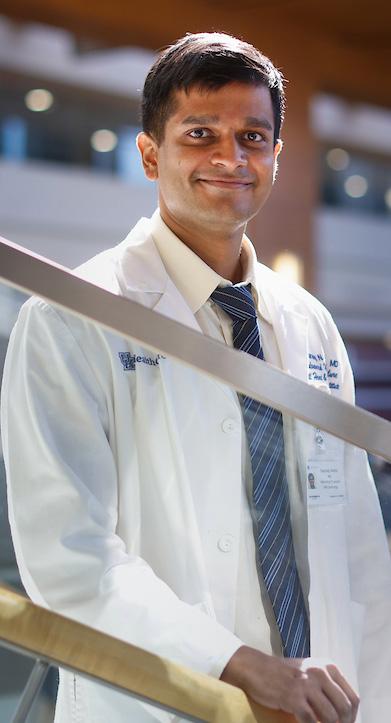
Dr. Vaidya is now an assistant professor of medicine at the University of Kentucky College of Medicine. With guidance and support from the Myocardial Recovery Alliance (MYRA) –and its principal investigators Emma Birks, MD, PhD, and Ken Campbell, PhD – he recently conducted a pilot trial to test an easier alternative: a portable ultrasound.
“Many people see the utility of being able to do a bedside assessment of a patient’s volume status using an ultrasound without requiring an invasive means of putting a catheter through their vein into the heart to measure pressure,” Dr. Vaidya said.
Dr. Vaidya’s clinical trial tested the accuracy of using a portable ultrasound to measure a patient’s right atrial pressure and determine whether that patient has excess water and is congested. He used an iPad connected to the ultrasound, which allowed for a portable assessment at the patient’s bedside, and in less than five minutes. The clinical trial examined patients who were scheduled to undergo right heart catheterization, allowing researchers to compare results and test the accuracy of ultrasound with direct invasive parameters.
The results were promising, and they garnered national attention. They were presented at the American College of Cardiology, and the abstract was selected among the top of those submitted at the American Society of Echocardiography.
EARLY-CAREER FACULTY EXCEL UNDER
22 |
As Part of MYRA, Dr. Vaidya Makes Strides in Improving Care for Patients with Heart Disease
K-RALD’s Dr. Sturgill Established Infrastructure Helping UK Handle COVID-19 Lung Samples
By the time COVID-19 first reached the Commonwealth, UK HealthCare had already established a system for efficiently collecting lung samples to propel important research forward. That’s thanks to Jamie Sturgill, PhD.
Dr. Sturgill is part of the Kentucky Research Alliance for Lung Disease (K-RALD), a team of clinicians and scientists combatting lung disease with support from the UK College of Medicine Alliance Research Initiative. In 2019, shortly after the K-RALD team was awarded Alliance funding, Dr. Sturgill led the development of a lung biobank to collect and study samples of lung, blood, and alveolar fluid. Initially, the biobank was intended to help researchers and clinicians study traditional lung diseases that impacted Kentuckians such as acute respiratory distress syndrome (ARDS) and pulmonary fibrosis.

Then, in 2020, COVID-19 spread rapidly across the U.S. But K-RALD’s lung biobank team was already talking to patients and families, screening, enrolling, and collecting samples. In a time of health care urgency, “it just made that transition so much more simple,” Dr. Sturgill said.
Dr. Sturgill has been involved in every intensive care unit (ICU) collection for every COVID-19 sample UK researchers have used. Her team has followed every person who has gone on to have a lung transplant after suffering from COVID-19.
“We’re really facilitating the ICU clinical care to the lab and back,” she said.
OAK’s Dr. Samaan Leads Study to Advance Treatment for Hip Osteoarthritis
As part of the Osteoarthritis Alliance of Kentucky (OAK) – and thanks to that collaboration and inspiration from his colleagues at UK – Michael Samaan, PhD, is leading a project funded by the National Institute of Aging (NIA). He will work to develop a novel experimental approach to investigate the potential role of the hip musculature on hip joint mechanics, pain, and cartilage health in hip osteoarthritis.
In short, Dr. Samaan’s project will challenge the notion that exercise-based programs are the most effective treatments for patients with hip osteoarthritis.

“If you have someone who has severe joint pain, and you tell them to go walk 20 minutes a day, they probably can’t do that,” Dr. Samaan said. “So I started thinking through it and thought, ‘Well, maybe it’s the muscles not working properly?’ That’s going to affect the way your joint moves, and in turn, maybe leads to abnormal loading patterns which start to break down cartilage, and the pain starts to become more evident.”
Dr. Samaan’s goal with the NIA study is to develop a new, multi-modal experimental platform including magnetic resonance imaging, muscle-function assessment, musculoskeletal simulations, and biochemical biomarkers to assess the pathomechanism and corresponding effects of hip extensor dysfunction during aerobic exercise.
The leadership and faculty in OAK, he says, have been vital in preparing him for this big step in his career.
| 23
M2, BOWLING GREEN CAMPUS HOMETOWN: LAS VEGAS, NV
TRAILBLAZERS IN Medicine
First-generation college students and current medical students at the University of Kentucky explain why a college education was so important to them and how it will lead them to success in their future careers as physicians.

Q: Why was going to college important to you?
DM: Going to college was important because I wanted a career, not a job. As a child, I would see people dread going to work. Receiving a paycheck every two weeks was the highlight of the job. I desired a new direction. I wanted to be in a profession that I loved and enjoyed going to every day. Most of my mentors who loved their careers went to college. I decided to take the same route.
Q: What was your biggest worry/ challenge when starting college?
DM: When starting college, I felt behind compared to my Kentuckian counterparts, particularly in my S.T.E.M. courses. I struggled to grasp the basic concepts of what I needed to know. During high school, I was the student who helped people with coursework. It was difficult for me to ask for help. In the beginning, I struggled because of my pride. I feared asking for help would portray me as weak and incompetent. This was my first time going to a tutor. At that moment, I realized it was OK to ask for help. I was able to excel in the classes where I was previously struggling.
Q: Where did you go for undergrad, and why UK for medical school?
DM: I went to Kentucky Wesleyan College (KWC) for undergrad. The UK College of Medicine-Bowling Green Campus would visit KWC at least twice an academic year. I loved the curriculum and the family atmosphere of the Bowling Green Campus. It was important for me to attend a school that valued diversity and had an excellent curriculum. During my sophomore year, I visited the UK College of Medicine-Bowling Green Campus and loved the tour. The students and faculty were great! My group asked multiple questions because we wanted to know how we could become great applicants for medical school. More importantly, we wanted to know how to get admitted into the UK College of Medicine-Bowling Green Campus.
Q: What do you hope to achieve with your college degree(s)?
DM: With my college degree, I will help reduce health disparities in low socioeconomic communities and practice medicine as an anesthesiologist. The field of medicine has come a long way from simply reducing stereotypes and ideologies that affect the type of care and treatment that an individual
receives. However, there is still more work that needs to be done. As a youth, I saw firsthand how the health care system failed Black patients such as my mother. I believe that issues with health care access and disparities can only be addressed by physicians who truly advocate for underserved patients.
Q: Do you have any advice for future first-generation college students?
DM: I would advise first-generation college students to never give up! While there may be challenges and adversities that seem discouraging, it will all work out. I know that the pathway to medicine may seem petrifying, especially if you are the first to do so. However, I am here to tell you to keep going! Make sure you utilize the resources available to you, whether from school or online, to help you become a great applicant. When future students see you as a physician, it will inspire them to choose medicine. When patients see individuals who reflect themselves, it is easier to establish trust, which leads to better care. No matter what anyone says, always remember to believe in yourself because you can do it!
UNDERGRAD: KENTUCKY WESLEYAN COLLEGE
24 |
“I know that the pathway to medicine may seem petrifying… keep going.”
Q: Why was going to college important to you?
SS: I think that being the first to do anything is scary. I come from a long line of hard workers from eastern Kentucky and southwest Virginia. From coal mining to raising children, my family fought coal dust and poverty to ensure that each generation had a better chance than the last. Not only did my family not have the money to send their children to college, but it was a terrifying thought to send your babies far away into this big world of unknowns as no one had ever done it before.
My dad was unfortunately injured in a devastating coal-mining accident at an early age. Living on disability, we struggled at times, and I began waitressing at 14 years old at a local restaurant. Though I loved working, I knew there was something else out there for me – I just had no idea how to get there. Luckily, I had many teachers and mentors along the way who guided me in the right direction. I wanted to “make it” for those in my family who never had the opportunity, but I needed a lot of guidance in getting there. After getting a full scholarship to UK, I knew that this would not only be an investment for my future but also a “thank you” to those who worked and sacrificed to help me get there.
Q: What was your biggest worry/ challenge when starting college?
SS: I graduated from East Ridge High School in a class of around 150 students. Imagine my surprise when I walked into my first general chemistry course on the first day of freshman year to 300 faces staring back at me. I’m surprised I didn’t walk myself back to K Lot that second and hit the Mountain Parkway back to Pike County. I worried then, and still worry now to an extent, that the stereotype of eastern Kentucky that is often portrayed in the media will overshadow who I am as a person. I used to worry that my classmates would think I was unintelligent if I asked a question, or as silly as it sounds, would believe that I was let in by mistake. I was afraid that I wouldn’t be able to keep up in my classes and wasn’t cut out for college. I spent so much time worrying that being from eastern Kentucky would be my weakness, but it was my strength all along.
Q: Why UK for medical school?

SS: Even as a little girl, I can remember envisioning the University of Kentucky as the most perfect place. I had known of a few older kids from Elkhorn City that went to UK and were extremely successful. To me, UK seemed to be the place where possibilities were endless, and no dream was out of reach, even for kids from Elkhorn City. As I earned my degree in human nutrition at UK, I learned that the high standard of education did not stop at undergraduate studies. Aside from its prestigious academic reputation, the most persuading factor in pursuing my medical education at UK College of Medicine was its unwavering dedication to rural medicine. My decision to join the Rural Physician Leadership Program, a UK College of Medicine program geared towards shaping the next generation of rural physicians, has been one of the most rewarding decisions of my lifetime. I have gained unmatched experience in rural health care and feel confident in my ability to take what I have learned and truly make a difference in a rural community. UK saw a grave health care need in rural Kentucky, which I call home, and developed a program to bridge the gap. For that, I am grateful.
Q: What do you hope to achieve with your college degree(s)?
SS: My passion lies with women’s health. Caring for a population that often puts others before themselves is a gift that I will never take for granted. Specifically, I hope to do my part in tackling the opioid epidemic by getting involved in medication-assisted treatment during pregnancy. Joining the fight against opioids and (hopefully) becoming part of the solution is a cause that is very near to my heart. Additionally, I hope to invest in the next generation of rural physicians by serving as a mentor.
There is no way I’d be where I am today without the help of mentors along the way. A promise I made to each of them was that I would pay it forward, and that is a promise I plan to keep. If I can inspire at least one budding rural physician that they have what it takes to make it in medicine, I will consider my career a success.

Q: Do you have any advice for future first-generation college students?
SS: My advice for future first-generation college students is to proudly be the first. It will be scary. You will want to quit and return to what is familiar. With every feeling of uncertainty, remember that there were likely many before you that only dreamed of being where you are. For those coming from unfortunate situations, please remember that it only takes one brave person to break a generational curse. When things get hard, and you feel like giving up, remind yourself who or what your purpose is in chasing this dream. There are so many of us out here that had to be first, and we must lean on one another. I know your fears because I have also feared them, but it can be done. If no one has told you today, I am so proud of you.
| 25
“I wanted to ‘make it’ for all of those in my family who never had the opportunity.”
Dr. Mary Sheppard Receives First-Ever Alliance Mentorship Award
One of the goals of the Alliance Research Initiative is the development of mentorship for all members, especially early-career physicians and scientists. This year, the Alliance Research Initiative celebrated that commitment with the conferral of the first Alliance Mentorship Award.
Mary Sheppard, MD, co-associate director of the Saha Aortic Center and member of UK-AARC (Aortopathy Alliance Research Center), is the first to accept the Alliance Mentorship Award, an honor she describes as exciting and humbling.
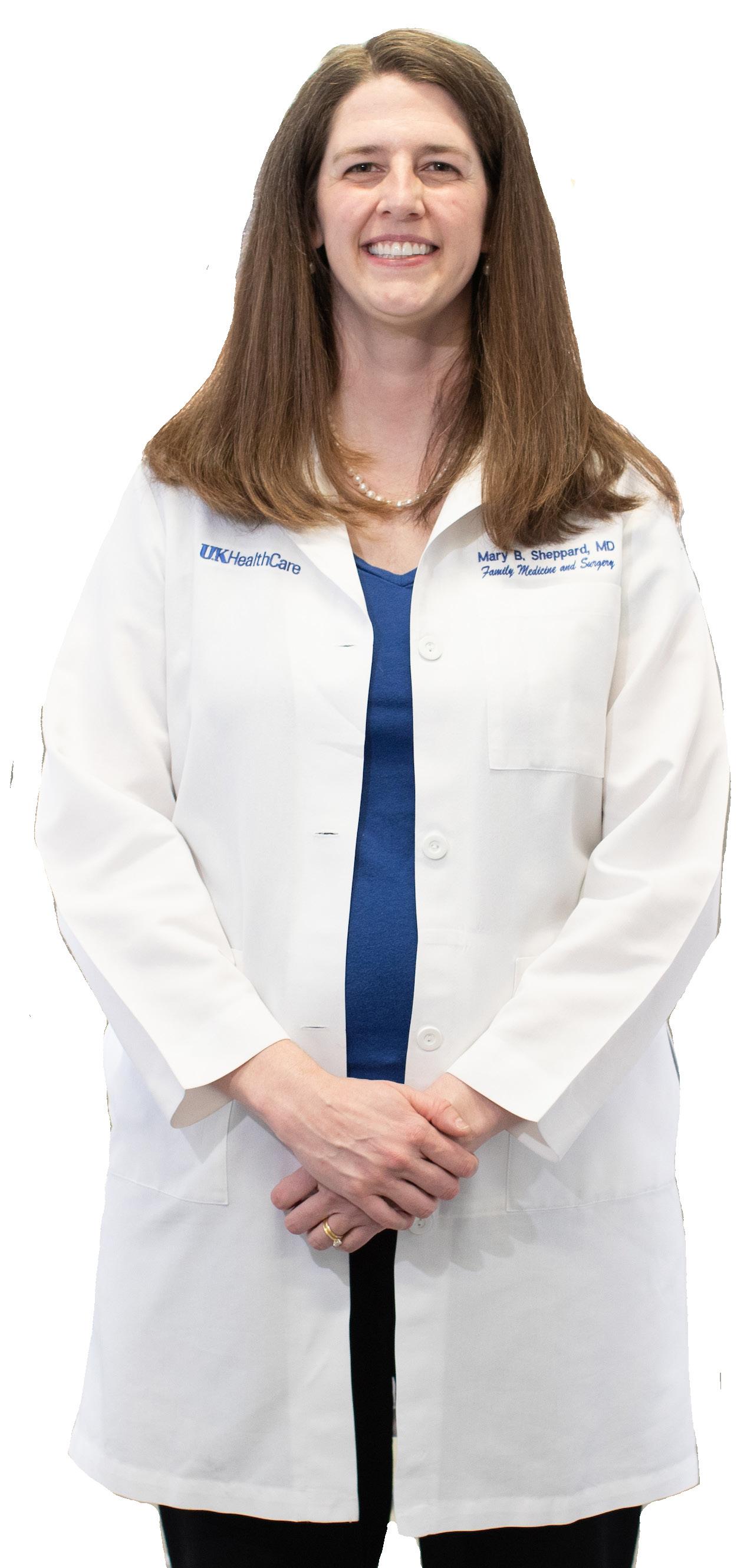
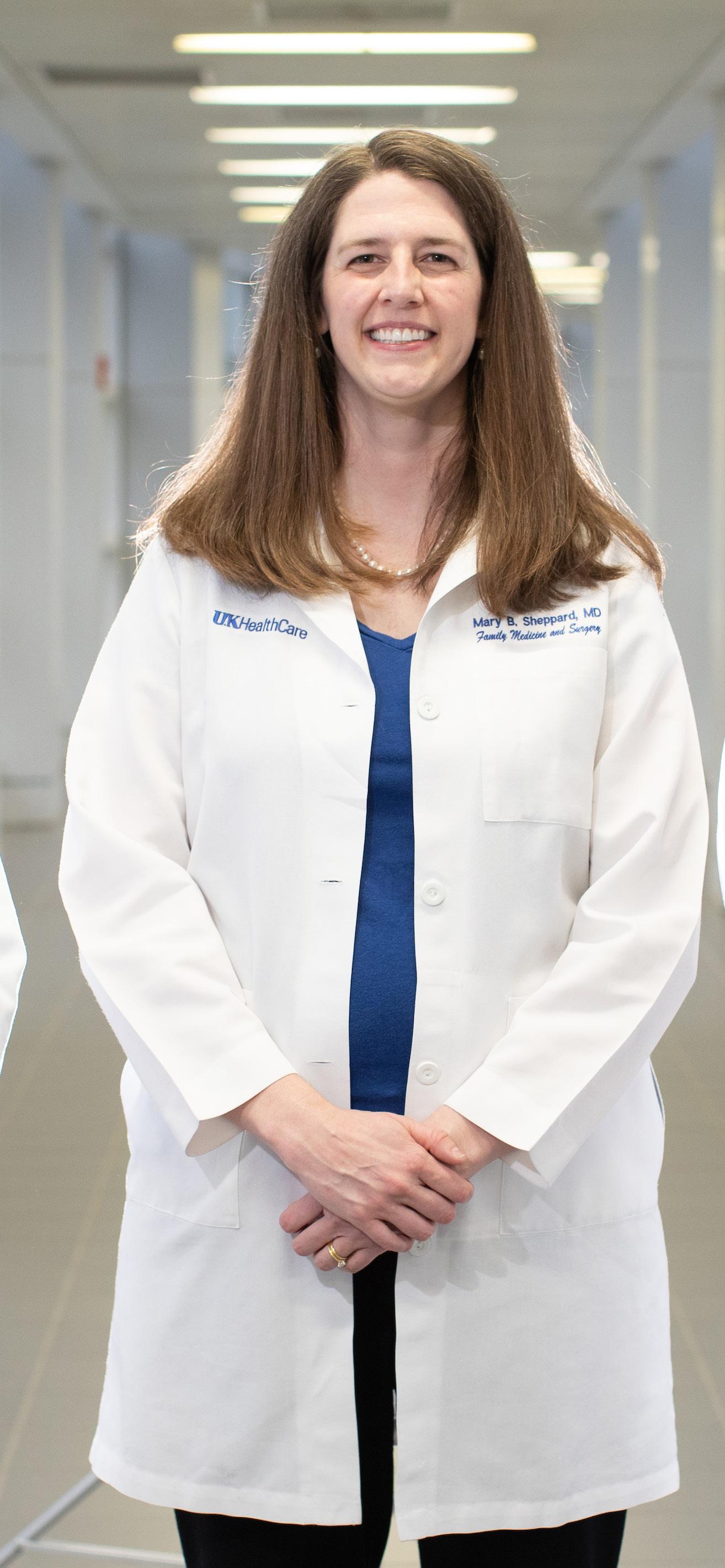
“It’s exciting because of all the potentially great things that can help my patients, and humbling because the people you admire scientifically are trusting you to advance the field,” said Dr. Sheppard, who also is an assistant professor in the UK College of Medicine Department of Family and Community Medicine.
The Alliance Mentorship Award was established to fund continued mentoring of early-career faculty within Alliance Research Initiative teams. Part of the selection criteria was evidence that mentorship in the initiative’s first phase resulted in active research for the early-career faculty member – judged by grant submissions, awards, publications, and/or presentations.
Dr. Sheppard’s recent work through the Alliance Research Initiative includes a publication in Clinics in Sports Medicine on the correlation between physical activity and heritable thoracic aortic disease, as well as a new classification schema for aortic aneurysms in the International Journal of Angiology. In 2021, she was part of a study examining changes in aortic cell populations and gene expression in Marfan syndrome to better understand the molecular and cellular processes that lead to aortic aneurysms in those with the disease.
With funds made available with the award, Dr. Sheppard will expand her lab research on medications for patients with aortic diseases.
Among her mentors who helped make this possible, Dr. Sheppard singles out Alan Daugherty, PhD, DSc, director of the Saha Cardiovascular Research Center, and UK Vice President for Research Lisa Cassis, PhD. Both now are principal investigators with UK-AARC.
“Mentorship is essential to research,” Dr. Sheppard said. “No one starts research from nothing. A mentor will walk the journey with you. They’re someone who may have solved a similar problem and can guide you through the process of solving yours.
“And the mentors at UK are at the cutting edge.”
Dr. Sheppard explained that the Alliance Mentorship Award makes clear that “UK is committed to develop physicianscientists who can take the insights that they learn from their patients and use those insights to advance research.”
She emphasized that UK is willing to contribute money to make that possible.
26 |
Amentor might be defined simply as a senior professional willing and able to provide support and direction for younger colleagues or learners. But it’s also a challenge requiring particular skills and strengths. Just how are mentors made?
In her fourth and final year of residency in physical medicine and rehabilitation (PM&R), Jennifer Murphy, DO, MS, was named chief resident, an honor as well as a serious responsibility. In the PM&R program, the academic chief resident develops the didactic curriculum, communicates regularly with residents and other learners, and acts as an intermediary between attending physicians and residents.
It’s a demanding role, but Dr. Murphy has support from the Emerging Leaders Program, part of the Office of Graduate Medical Education (GME) Institutional Initiatives to train chief residents to be superb leaders. Now halfway through the program, Dr. Murphy praises Emerging Leaders for providing new insight into her leadership style.
“I’ve become more aware of how my behavior may be perceived and drive or stifle the productivity and teamwork of the entire health care team, not just other residents,” she said. “Thankfully, we have also been educated on viewpoints that may differ from our own and how to manage that in a productive way.”
The program introduces strategies for intentional leadership. “For our first meeting, we completed a DiSC assessment to evaluate our own behaviors and how they may be impacting others around us,” Dr. Murphy explained. “The second meeting provided insight not only into our own natural coaching styles, but into types of team members and how they are best coached. The last meeting to date provided us with tools for building trust within our teams.”
Dr. Murphy also values the breadth of involvement by GME residents and fellows. “The program has provided the opportunity to glean insight from chiefs across GME that I may not have otherwise had the opportunity to interact with.”
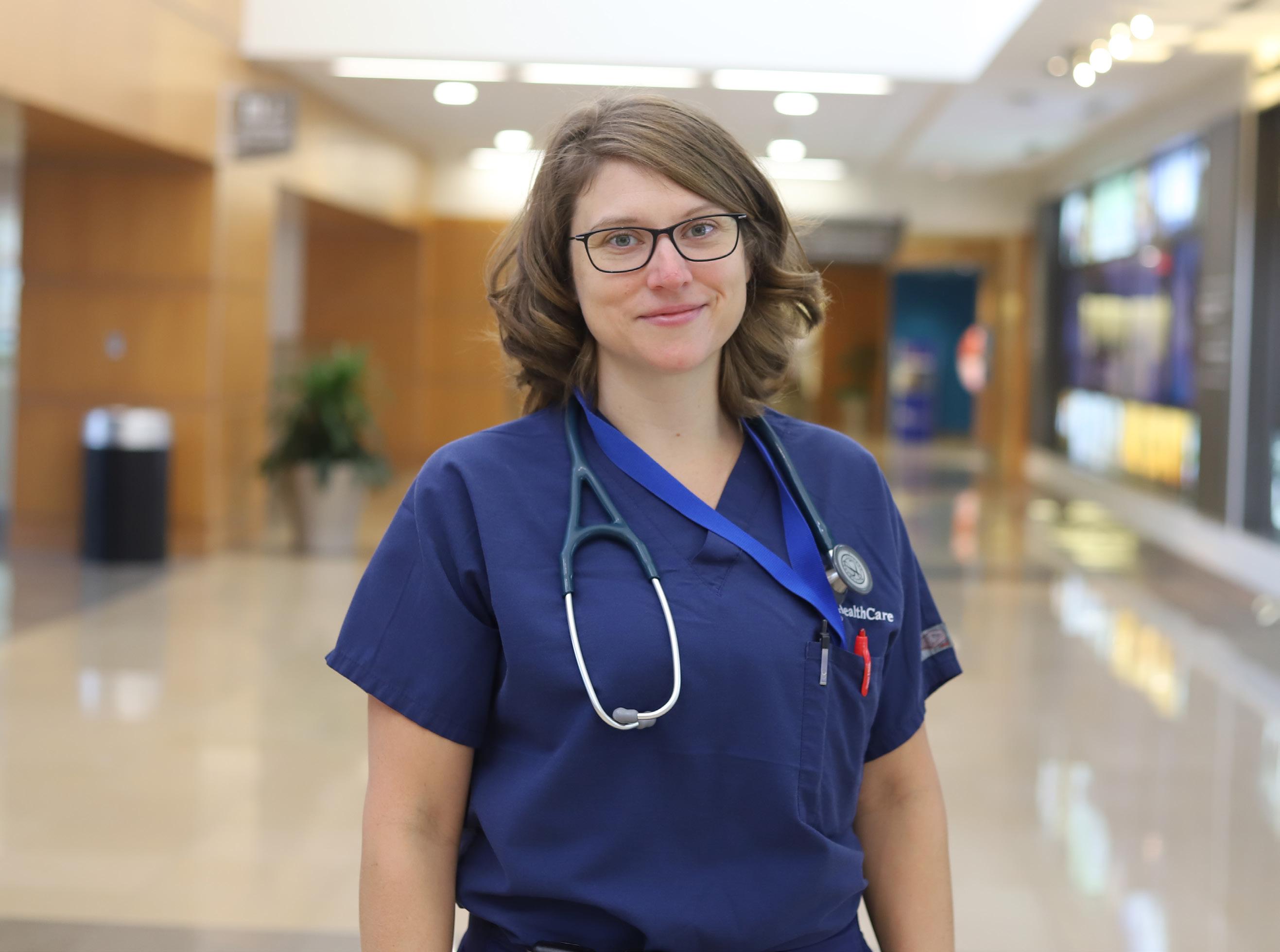
She has good advice for those learners looking for mentors. “Never underestimate the value of the unexpected mentor, that upper-level or attending you click with on rounds and things are just better. When you find those mentors, pick their brain for everything and anything. Never stop being a mentee and make yourself available to pull the next person up behind you as their mentor. You can never have too many mentors. Plus, if you are like me and have a lot of questions, it never hurts to spread the love!”
Dr. Murphy will begin UK’s interventional pain management fellowship in July 2023.
| 27
UK COLLEGE OF MEDICINE
The college celebrated alumni from multiple class years during the month of October.




The following photos of from our 50th and 55th class reception at The Origin Hotel in Lexington, Ky.




ALUMN RE NION
Dr. Elizabeth Rhodus Promotes ‘Healthy Aging across the Bluegrass’
Elizabeth Rhodus, PhD, has worked closely with older Kentuckians facing Alzheimer’s disease and related dementias (ADRD). She also has witnessed firsthand how poor health, limited resources, and high poverty rates have served as barriers to proper prevention and treatment.
Now, an assistant professor of behavioral science at the UK College of Medicine and Sanders-Brown Center on Aging, she has established a new program aimed at advancing the health of senior citizens in Kentucky communities, particularly communities that are underserved.

Dr. Rhodus’ program is called Healthy Brain Aging across the Bluegrass. The program supports improved health and well-being through community engagement to ensure early identification and intervention for risk factors of ADRD.
“All of this is in hopes to help prevention and delay onset of symptoms, as well as to continue to build the communitybased clinical trial enterprise at UK,” Dr. Rhodus said. “We’re looking at the resources we can provide and connect people with to improve their quality of life.”
This summer, Dr. Rhodus and her program were invited to join an event in Franklin County, Ky. Unity in the Community, organized by Rosby Glover, DMin, senior pastor of the First Baptist Church Frankfort. Health care professionals and 16 community health
care organizations volunteered services at First Baptist Church to provide COVID-19 immunizations, educational resources, and screenings for blood glucose, memory, nutrition, and emotional health.
More than 250 community members attended the event and were connected with vital resources. Dr. Rhodus’ team logged 50 balance screenings, 50 smoking cessation screenings, 41 diabetes screenings, 40 blood pressure screenings, 38 COVID-19 vaccines, and 25 memory screenings.

“It was really surprising because almost 50 percent of the screens across the board were abnormal, which really indicated the need,” Dr. Rhodus said. Diabetes screenings presented greatest risk with 26 people in diabetic range and 12 without prior diagnosis.
Many attendees also reported lack of insurance and limited transportation preventing health care access. Community partners were able to provide information on Medicaid and reduced payment options for medical care, as well as refer people to free clinics.
Dr. Crystal Totten Selected for National Diversity, Equity, and Inclusion Program
Crystal Totten, MD, assistant professor of surgery, was selected to the 2022 AAMC Healthcare Executive Diversity and Inclusion Certificate (HEDIC) Program, an intensive academic program of diversity education specifically designed to develop the competencies leaders needed to drive diversity as a core component of excellence in health care.
Upon completion of the program, participants are required to present their project before the cohort and instructors and at their institution.
Since the program launched in 2013, over 80 faculty and staff from over 50 AAMC member institutions and allied health associations have developed the competencies needed to drive diversity and inclusion as core components of excellence in health care.
Dr Totten’s project included the framework for an Individualized Professional Development Program from start date to year 7 of faculty employment; with interval assessments, self-reflection and strategic planning for career progression to combat delayed promotion readiness and attrition rates.
| 29
Elizabeth Rhodus, PhD, speaks to media about the need for Alzheimer’s disease prevention and intervention at the Healthy Brain Aging in the Bluegrass kick-off event June 11, 2022.
To Pursue
With $1 Million Donation
Jackie Cain Supports Students at Northern Kentucky Campus
You don’t need to convince Jackie Cain that Kentucky is a special place.
Though she was born in Chicago and attended high school in Florida, her time in between growing up in the Commonwealth – specifically Smiths Grove, Ky. – was enough for her to proudly call herself a Kentuckian. She loved it so much, she returned to attend the University of Kentucky to pursue her Bachelor of Arts.
For 59 years, Cain has resided in Northern Kentucky, where she and her late husband Rodney “Biz” Cain established a lifestyle of giving back to help their community thrive.
Recently, she directed her generosity to the UK College of Medicine-Northern Kentucky Campus, committing $1 million to create a scholarship endowment for physicians to complete their medical degree at the regional site. The endowment will pay it forward for generations, supporting physiciansin-training who will provide exceptional care to their communities.
Cain is not a UK College of Medicine alumnus, nor are her children or grandchildren. So why does she want to support the medical school?
Her reasoning is rooted in education, her love for Northern Kentucky, and her mission “to give a student a chance” to pursue this noble dream.
Though Cain did not attend the UK College of Medicine, it does hold significance. While attending UK, she was “pinned” by her husband in the medical school parking lot, meaning she was given a pin as a symbol of their commitment to one another. They were married six months after they met.
That’s the extent of Cain’s personal connection to the medical school, but her family has strong ties to the University. She and more than eight of her family members – including her husband, her sister-in-law, two of her sons, and two granddaughters – have graduated from UK. She also has two grandsons currently attending UK.
Cain has remained heavily involved in UK Women in Philanthropy. In fact, she was looking for a way to give back to UK when she came across the Northern Kentucky Campus.

The UK College of Medicine’s regional campus was established in 2019 in partnership with Northern Kentucky University (NKU) and St. Elizabeth Healthcare. Faculty teach the same curriculum available at UK College of Medicine’s main campus in Lexington and its other regional campus in Bowling Green.
This stood out to Cain, who recognizes that Kentucky needs well-trained doctors. And with 20 years teaching in the Kenton County School District, she also knows how vital it is to have strong education embedded in a community.
“I’ve watched Northern Kentucky grow so much, and having a medical school here is a really big deal,” she said. “I’m hoping some of these doctors will stay in our area or stay in our state.”
From left to right: Steven Haist, MD, MS, associate dean of the Northern Kentucky Campus; Jade Nicely, first-year student and inaugural scholarship recipient; Jackie Cain; John Cain; and Charles Griffith, MD, MSPH, acting dean of the College of Medicine.
30 |
‘TO GIVE A STUDENT A CHANCE THIS NOBLE DREAM’
The Biz and Jackie Cain Family Medical Scholarship Endowment will support annual scholarships for students accepted and enrolled in the College of Medicine-Northern Kentucky Campus who are in good academic standing, have demonstrated unmet financial need, and graduated from a high school in Boone, Kenton, Campbell, Pendleton, or Grant County, Ky.
By creating this endowment, she and her family have entrusted the UK College of Medicine with the responsibility of educating physicians who are prepared to treat Kentucky patients.


“It is truly an honor that Mrs. Cain and her family wanted to support Northern Kentucky Campus students with this generous gift, which will make a significant impact on medical education in the region and health care in the state,” said Steven Haist, MD, MS, associate dean for the campus.
The Cain Family’s endowment is a long-term philanthropic investment in the advancement of medical education in the Commonwealth. The first full group of four Cain Family scholarship recipients will receive their scholarships in the fall of 2023.
This year, Cain’s son John and daughter-in-law Carla, donated $10,000 for a one-time Cain Family medical student scholarship. During the Northern Kentucky Campus’s white coat ceremony in July, it was presented to first-year student Jade Nicely, who attended UK for her undergraduate degree and is from the Northern Kentucky area.
Northern Kentucky Campus
Nicely was able to meet Mrs. Cain during the white coat ceremony and said it was special getting to personally share how much the Cain family’s contribution meant to her.
“She was so kind,” Nicely said of Cain. “I am so grateful for the scholarship she and her family have provided for me, as it made my dream of going to school in my hometown possible.”
In her 59-plus years in Northern Kentucky, Cain has seen tremendous growth. Gravel roads have transformed to four-lane highways with bicycle paths. Many new housing developments have popped up to accommodate the population growth.
Apparently, others are catching on to the area’s greatness, she says.
Cain resides on a farm far enough in the countryside to see the stars and hear the frogs croaking at night, but close enough to enjoy all the arts events, concerts, and shopping the next morning in nearby Covington, Ky. And it is exactly where she wants to be.
Cain is thankful that she and her husband have been so deeply connected to the economic development of the region. Along with her plentiful contributions, her husband was a former Kenton County judge, Cabinet Secretary for Workforce Development under former Gov. Paul E. Patton, co-founder of The Bank of Kentucky, and entrepreneur who started Wiseway Plumbing and Lighting Supply, a company that just celebrated its 50th anniversary.
With the Biz and Jackie Cain Family Medical Scholarship Endowment, Cain is building another strong connection to another important part of Northern Kentucky, the special place she calls home.
“Other people have planted the trees,” she said. “We are just watering them.”
“It is truly an honor that Mrs. Cain and her family wanted to support Northern Kentucky Campus students with this generous gift, which will make a significant impact on medical education in the region and health care in the state.”
- Steven Haist, MD, MS
| 31
Each year, the Northern Kentucky Campus welcomes up to 35 students per class and provides exceptional medical education through the same curriculum taught across all UK College of Medicine campuses.
Bill Gatton’s Historic $5 Million Gift Supports Medical Students
A $5 million gift from the late philanthropist Bill Gatton will help thousands of young Kentuckians from underserved areas obtain a degree from UK. The scholarship program will also target students from medically underserved areas who want to attend medical school at UK.
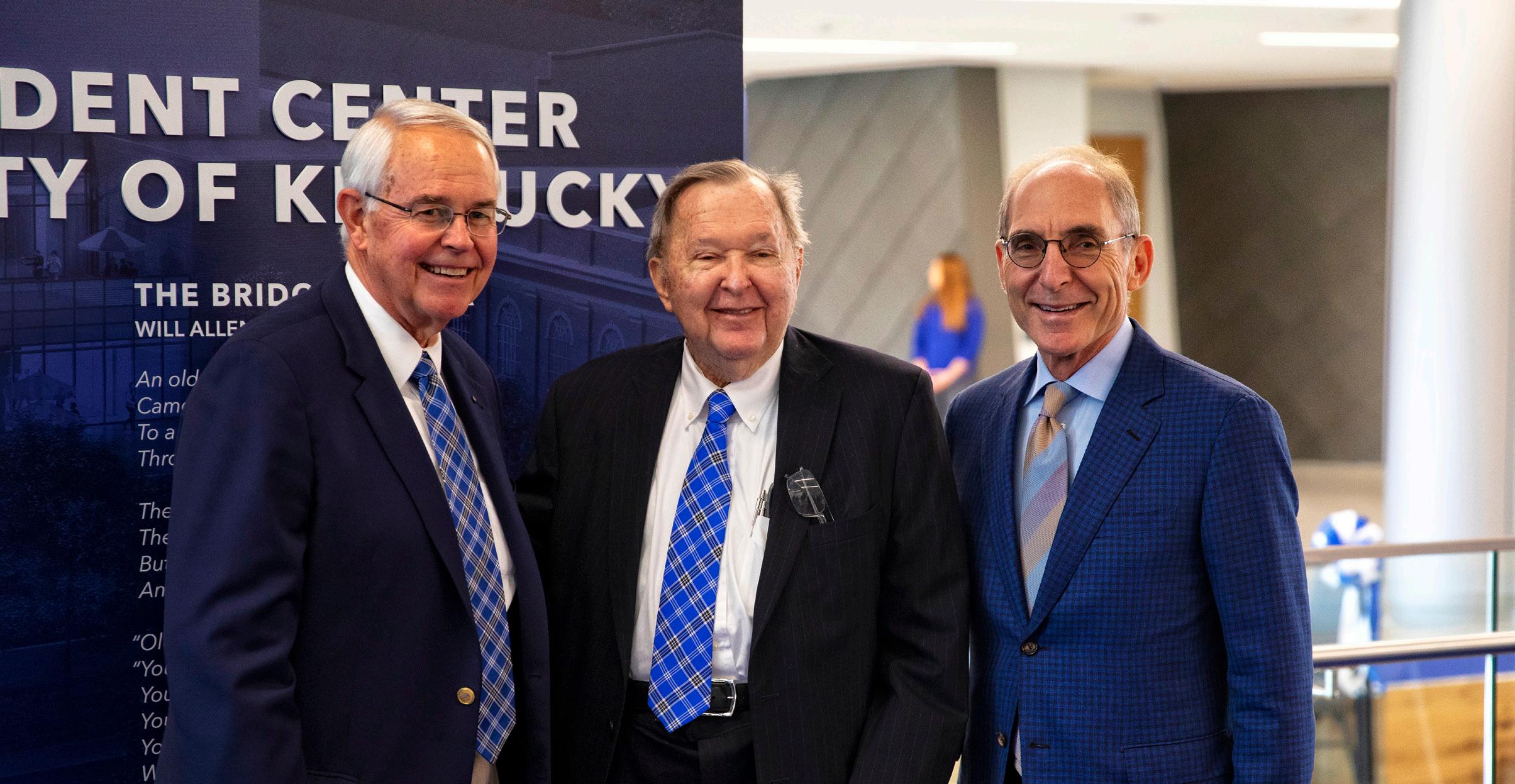
Mr. Gatton’s gift includes 40 scholarships of up to $25,000 that will be awarded for Kentucky students at the UK College of Medicine. Preference will be given to students from medically underserved areas.
Gatton has set a standard for philanthropy for more than 25 years. The college of business and economics at UK bears his name as does the University’s student center. He has provided the foundational gifts for both the Gatton College facility and the Gatton Student Center. But his philanthropy for UK — and needs across his native Kentucky — extend far and wide. The total impact of his gifts at UK now total more than $70 million.
*Adapted from UKNow
A Gift to the Dean’s CORE Society is an Investment in Kentucky’s Future Scan Here for Opportunities to Give

In the past decade, applicants to and enrollment in the UK College of Medicine have grown. This growth is essential as Kentucky and the United States as a whole face a shortage of physicians. While a shortage looms, the college is working hard to continue to recruit, educate, and train highly qualified physicians.
The Dean’s CORE Society Scholarship provides support to deserving students as they pursue their degrees to lessen their financial burden. The scholarship is awarded to College of Medicine students based on three categories: need, merit, and enhancement. This fund was established to provide scholarship support to medical students who demonstrate:
Compassion Operational readiness Resilience
Excellence in their pursuit of medical education
32 |
From left to right: Mike Richey, Bill Gatton, and UK President Eli Capilouto at the dedication of the Gatton Student Center on Aug. 31, 2018.
CREDITS
UK Medicine magazine is a publication of the UK College of Medicine.

For more information, write: University of Kentucky College of Medicine

780 Rose Street, MS 335E Lexington, KY 40536-0298
Editor: Audrey Kirby, Communications Director, Email: Audrey.Kirby@uky.edu | Phone: 859-323-1143
Photography: Arden Barnes, UK Photo; Dana Rogers Photography; Jorge Castorena, UK College of Medicine
Communications; Mark Cornelison, UK Photo; James Haggie, Sanders-Brown Center on Aging; Audrey Kirby
O’Gara, UK College of Medicine Communications; Chris Kohley Photography; Mark Mahan Photography
Editorial: Lauren Greathouse, UK College of Medicine
Communications; Audrey Kirby, UK College of Medicine
Communications; Regina Higgins, Contributor
Design: Jordan Gieselman, UK College of Medicine Communications
Copyright © 2023 University of Kentucky. All rights reserved.
An equal opportunity university. No part of this publication may be reproduced without written permission of UK College of Medicine.
@UKYMEDICINE medicine.uky.edu Connect WITH US


Non-Profit Org. US Postage PAID Lexington KY Permit #51 UNIVERSITY OF KENTUCKY College of Medicine 780 Rose Street, Suite 150 Lexington, Ky 40536-0298 https://provost.uky.edu/heb Learn more about THE UNIVERSITY OF KENTUCKY’S New Health Education Building that will provide an exceptional educational setting to prepare the next generation of health professionals.



















 biostatistics.
biostatistics.

























































